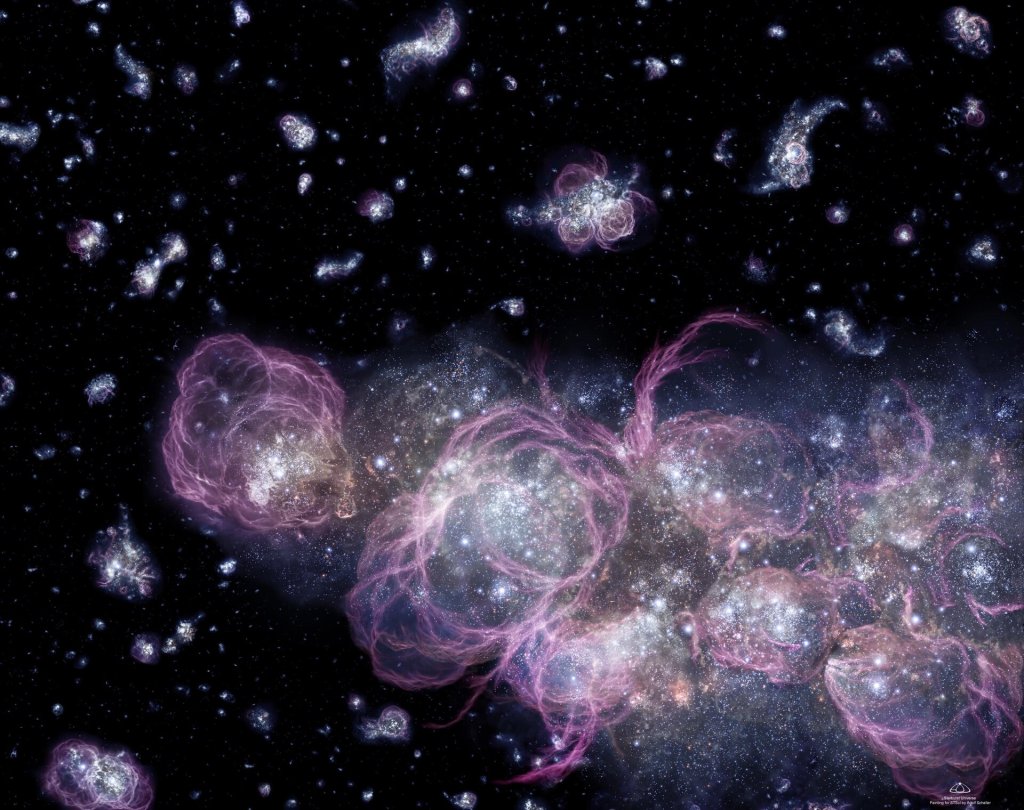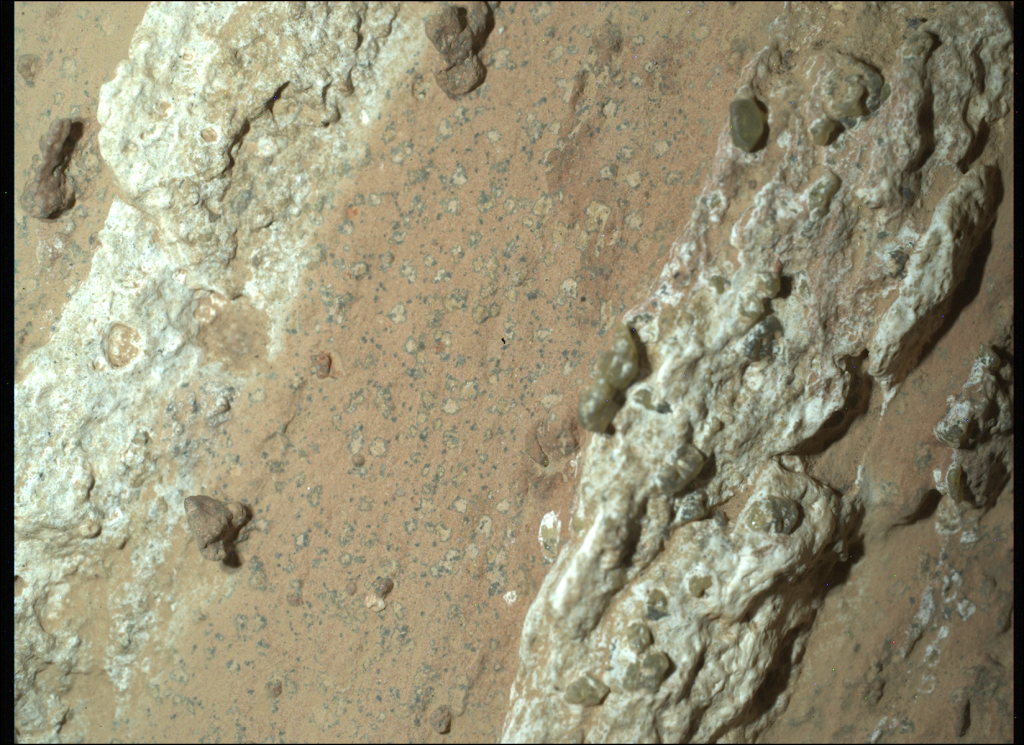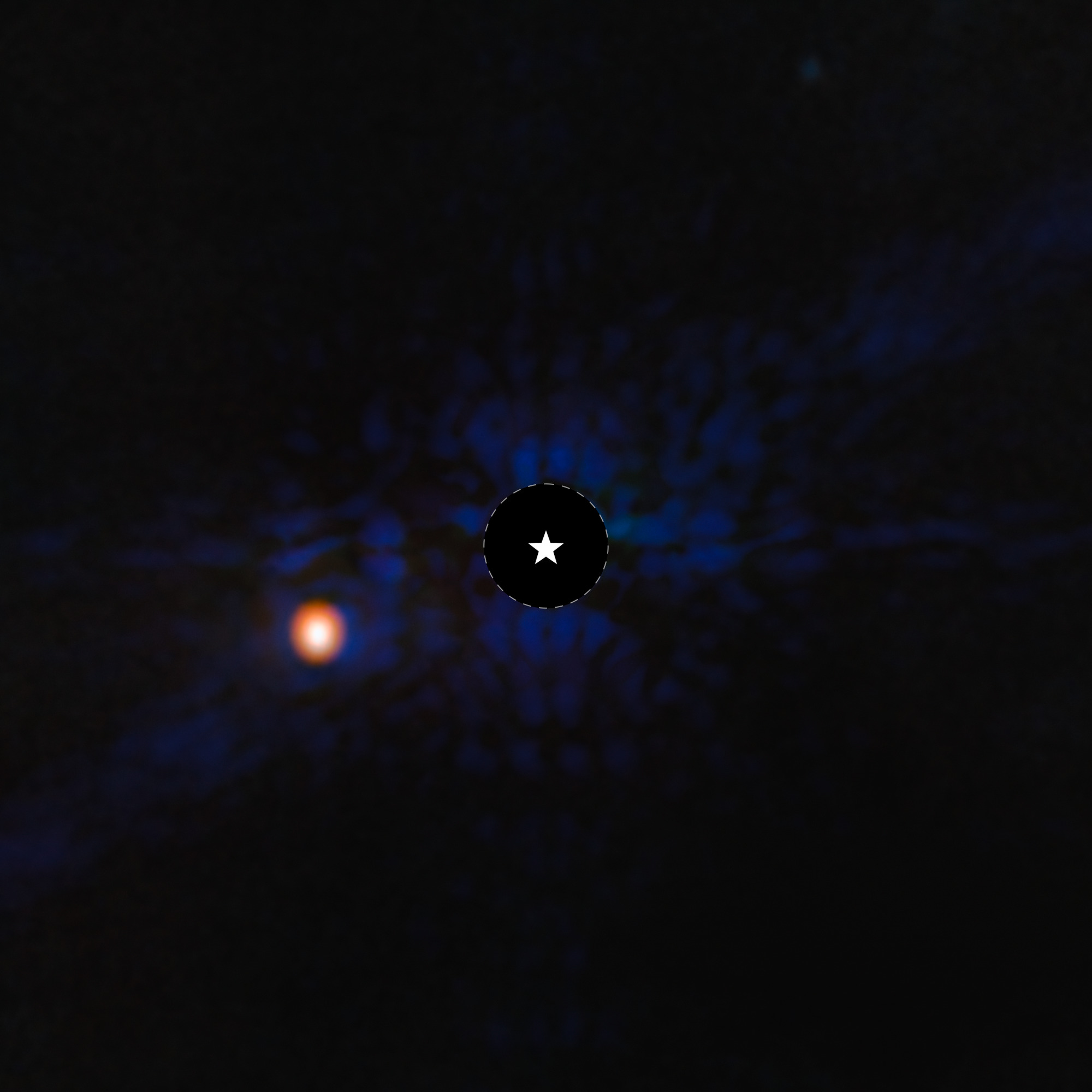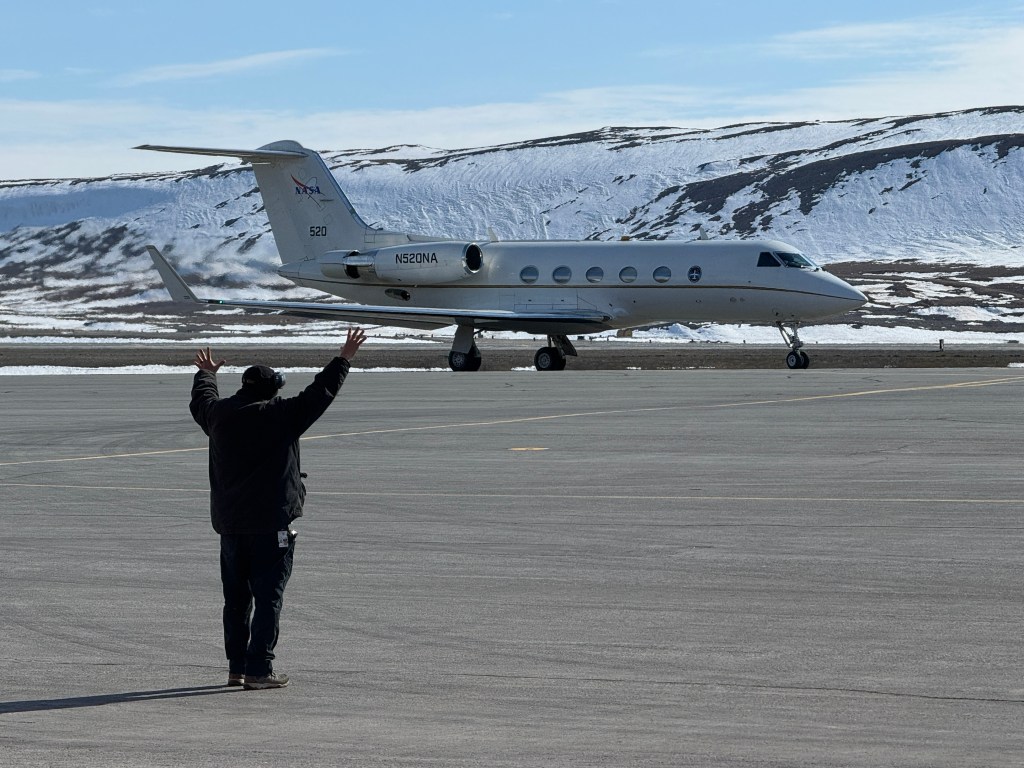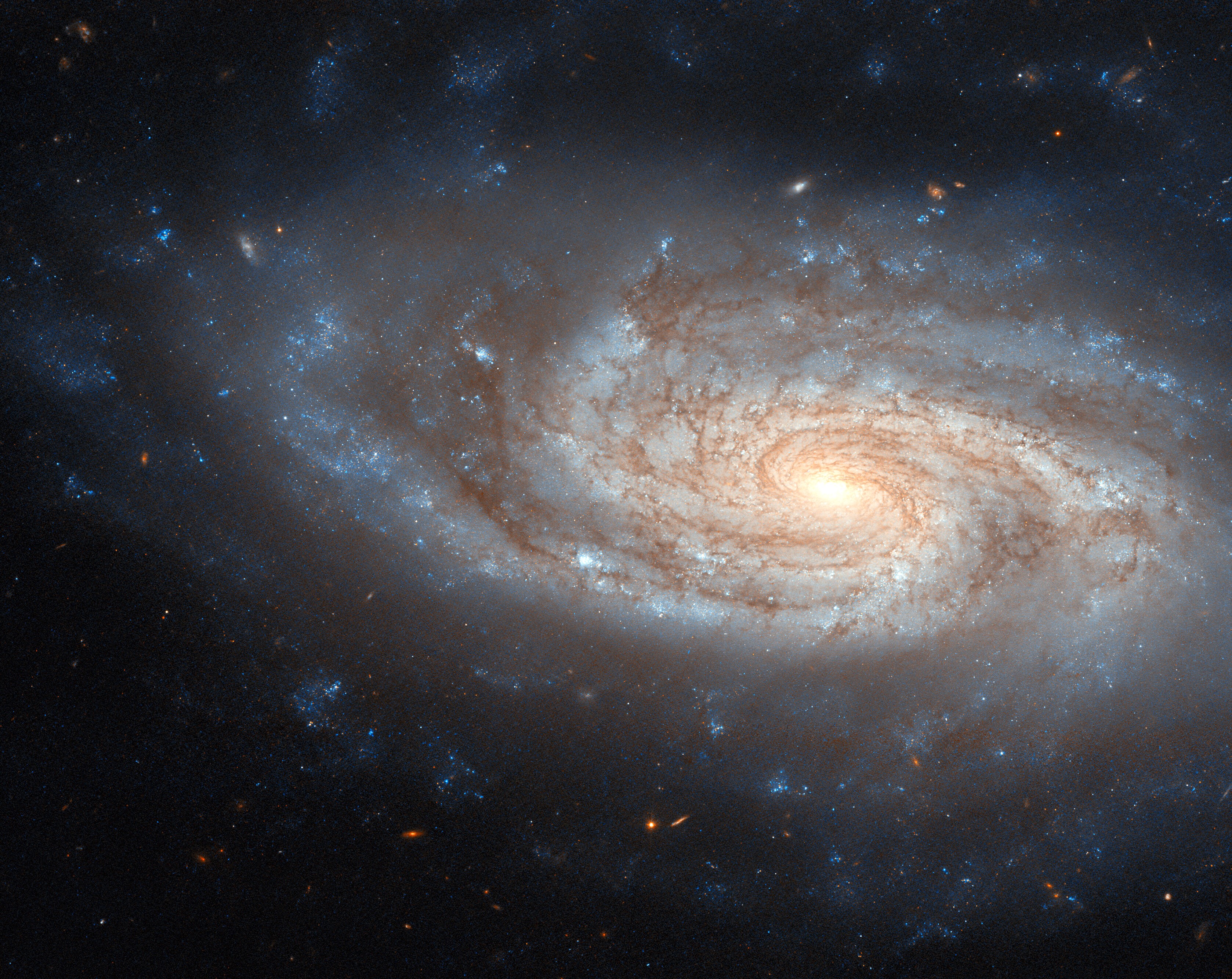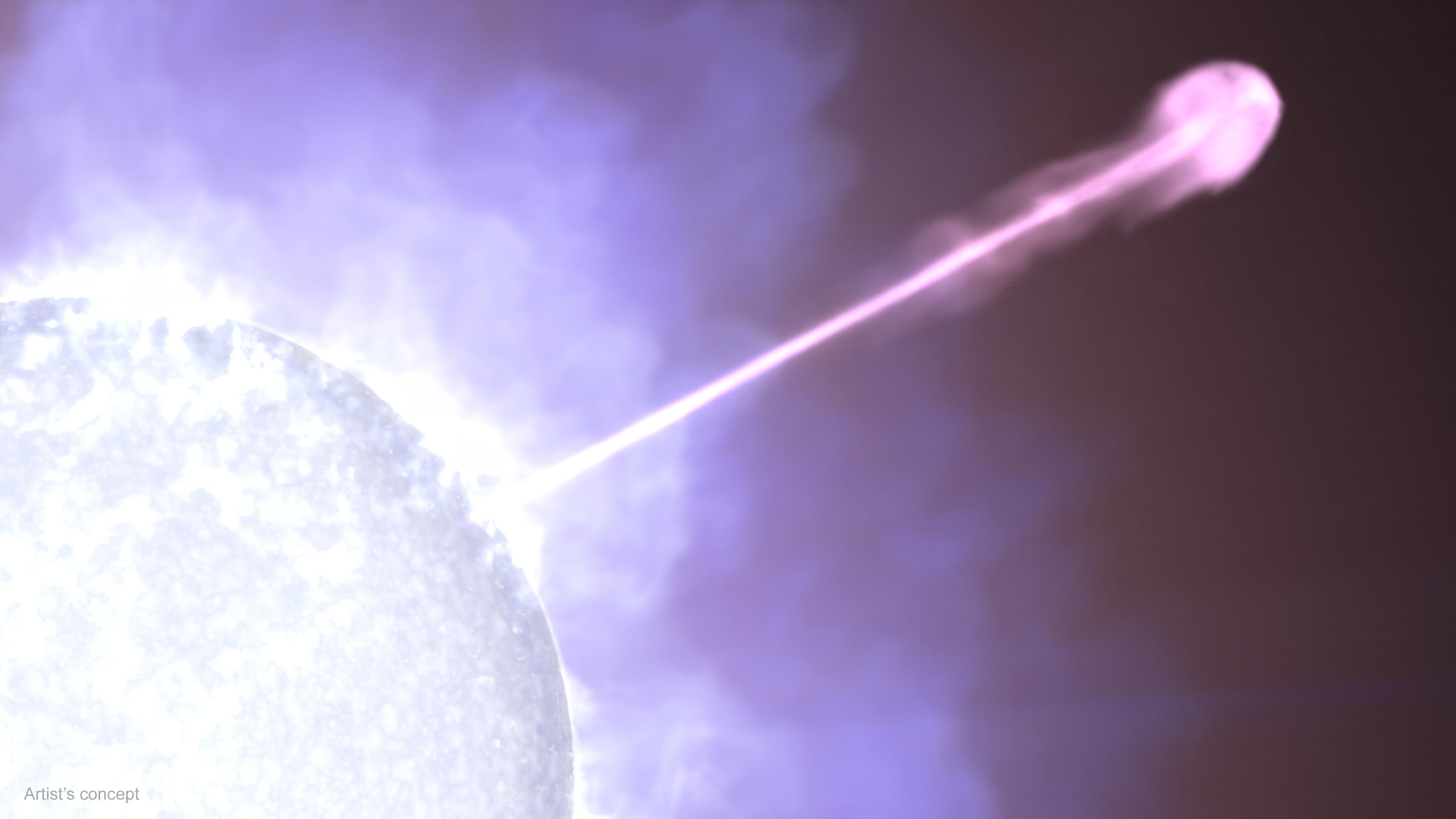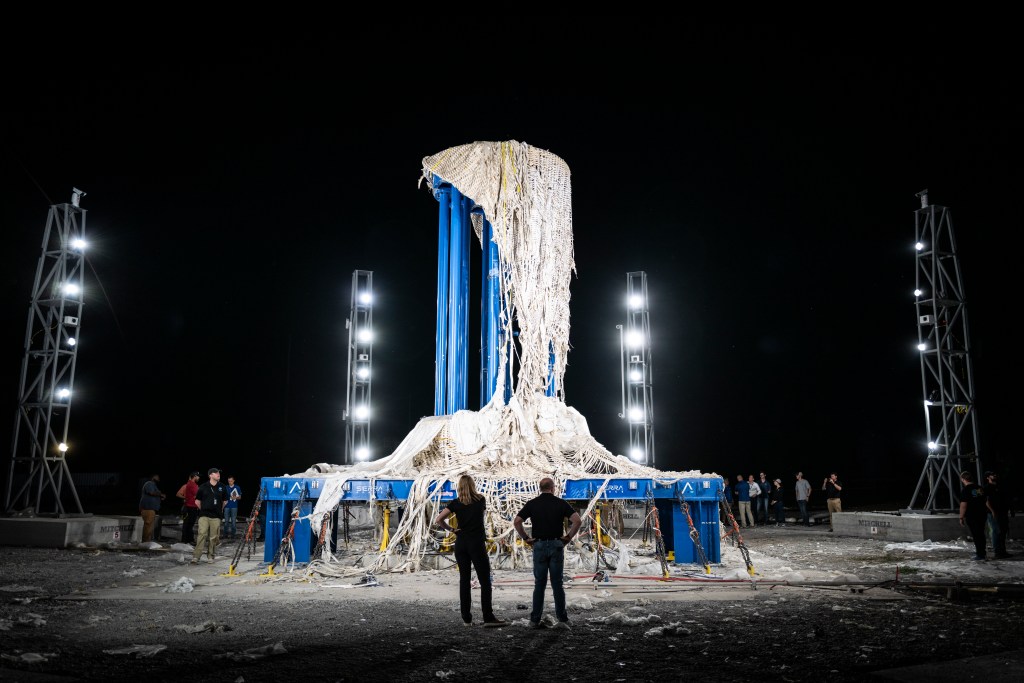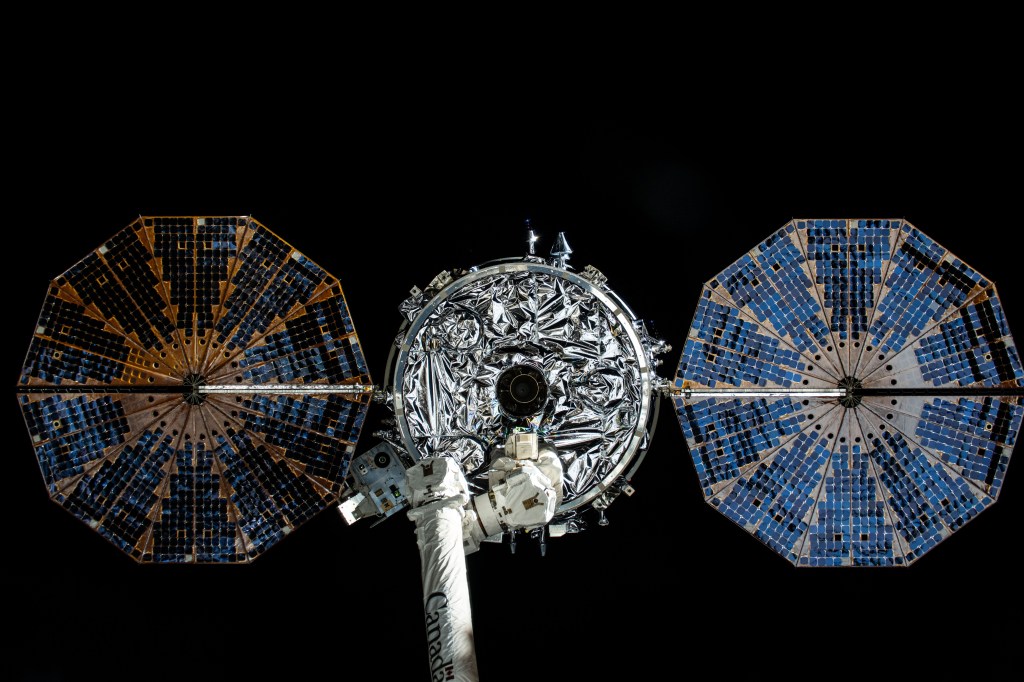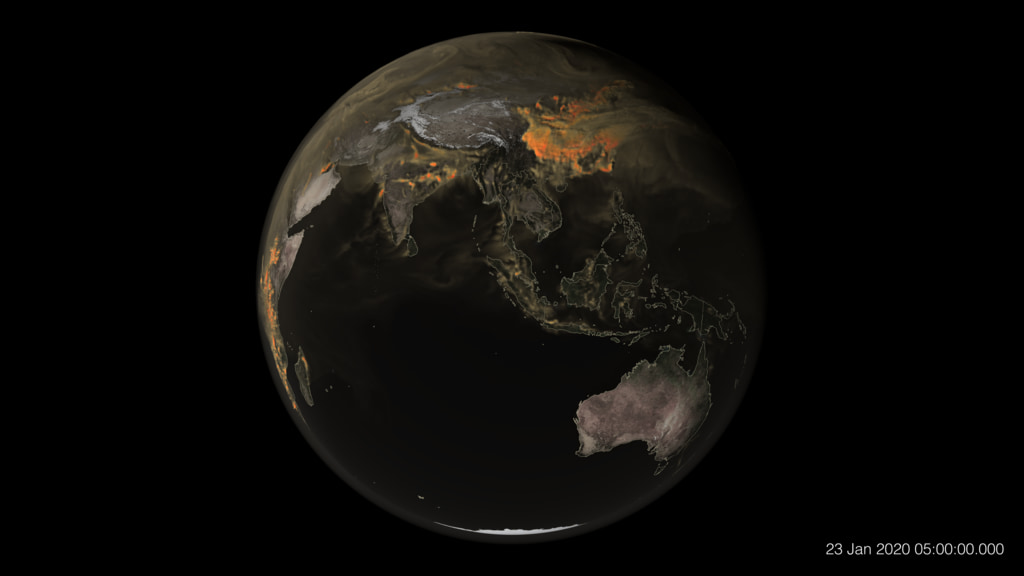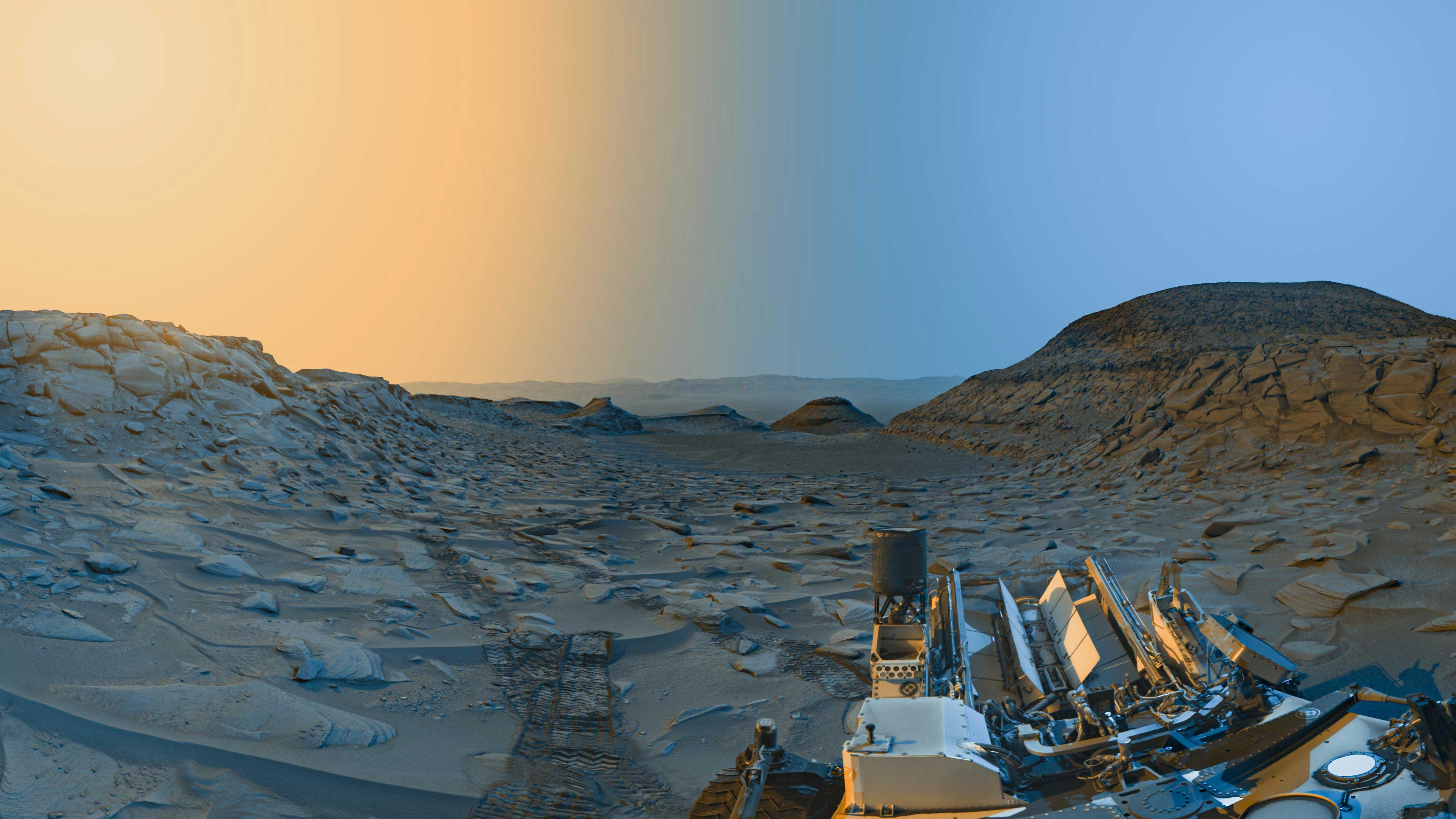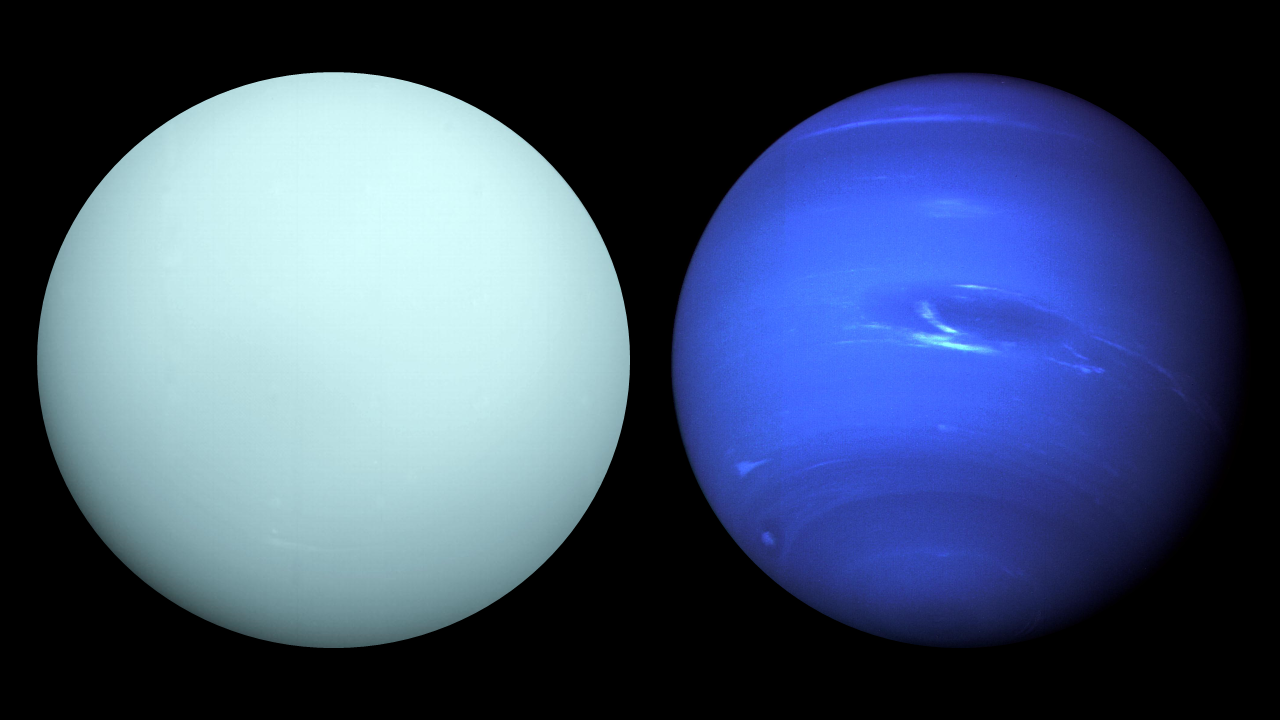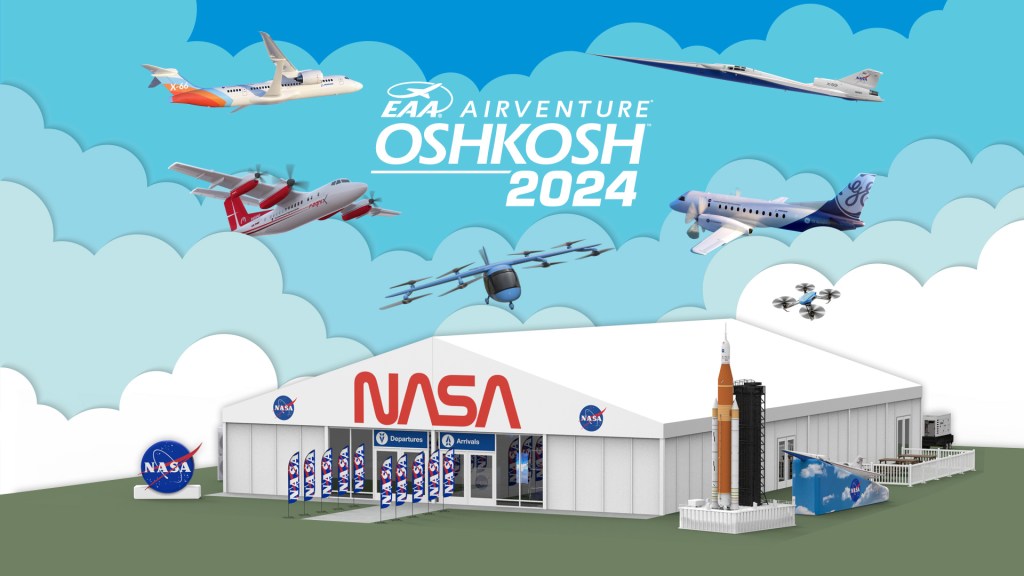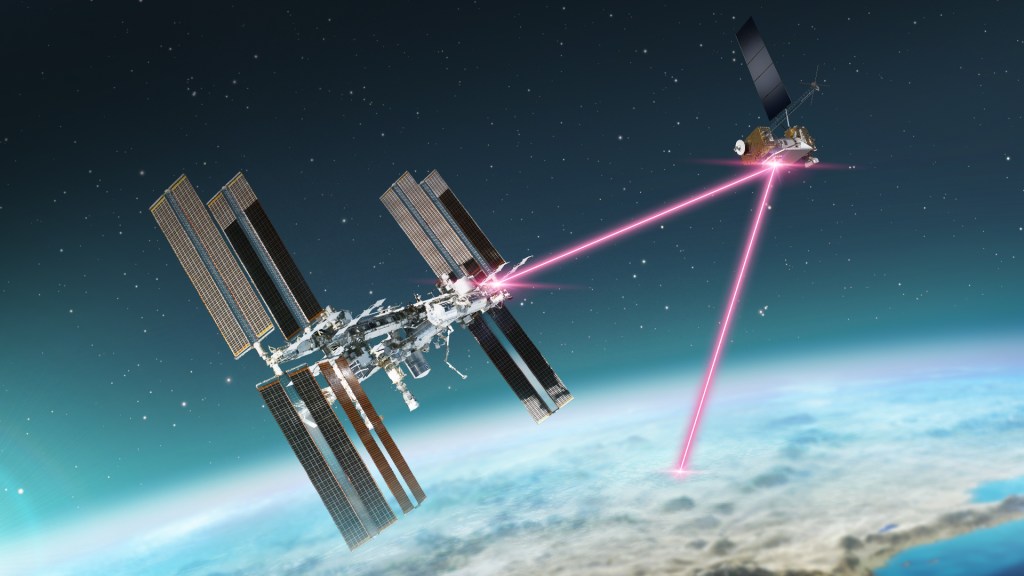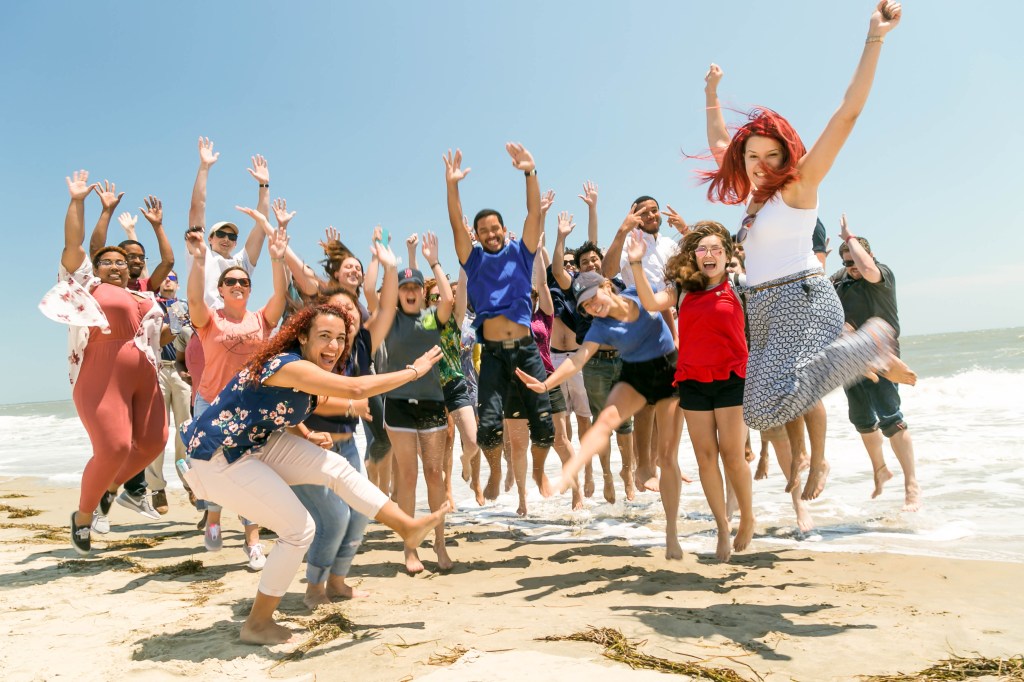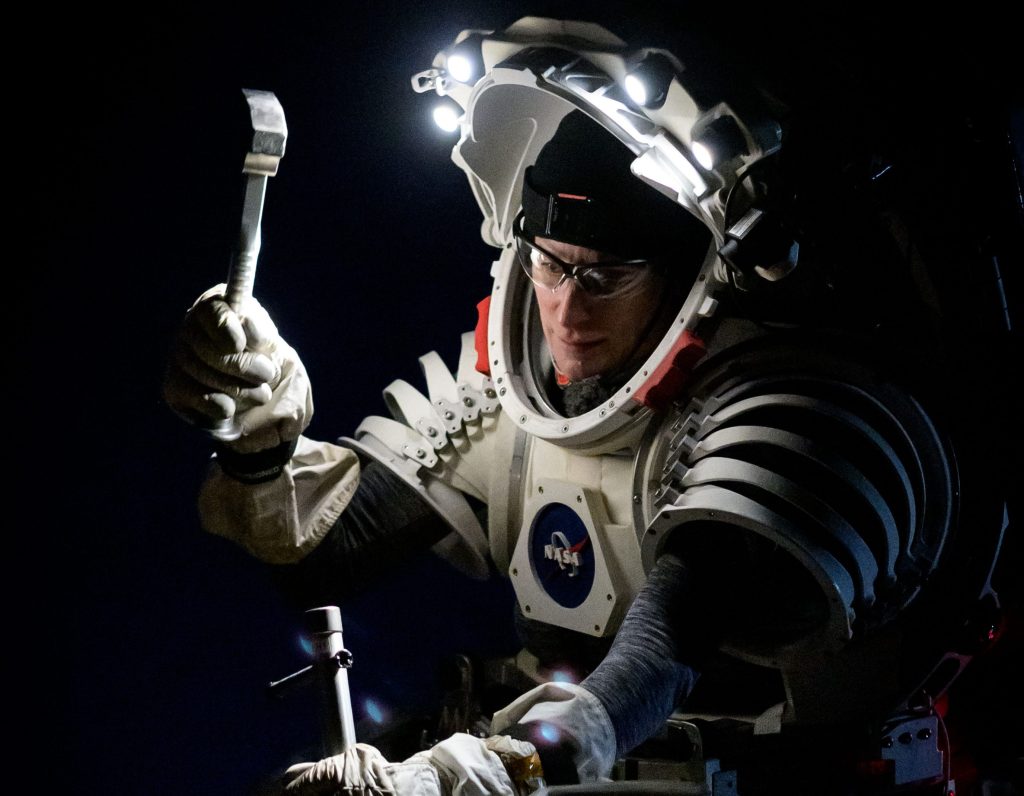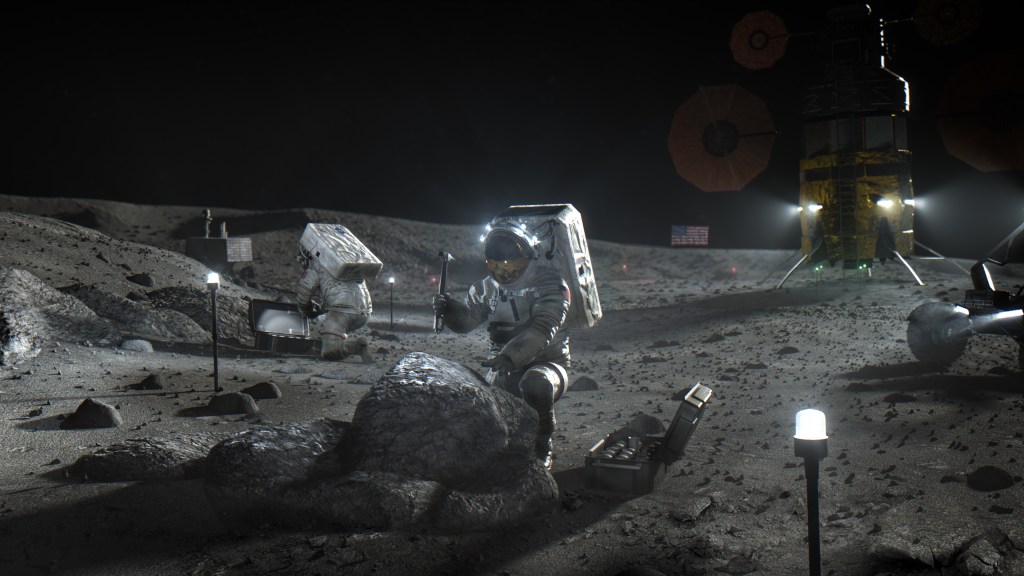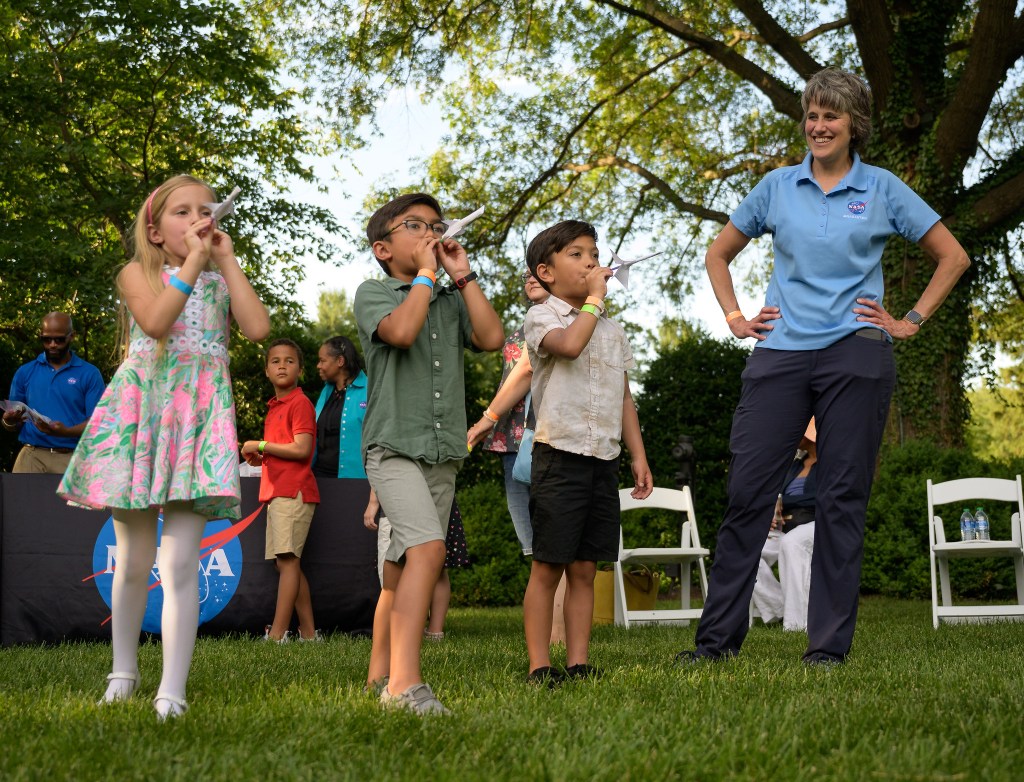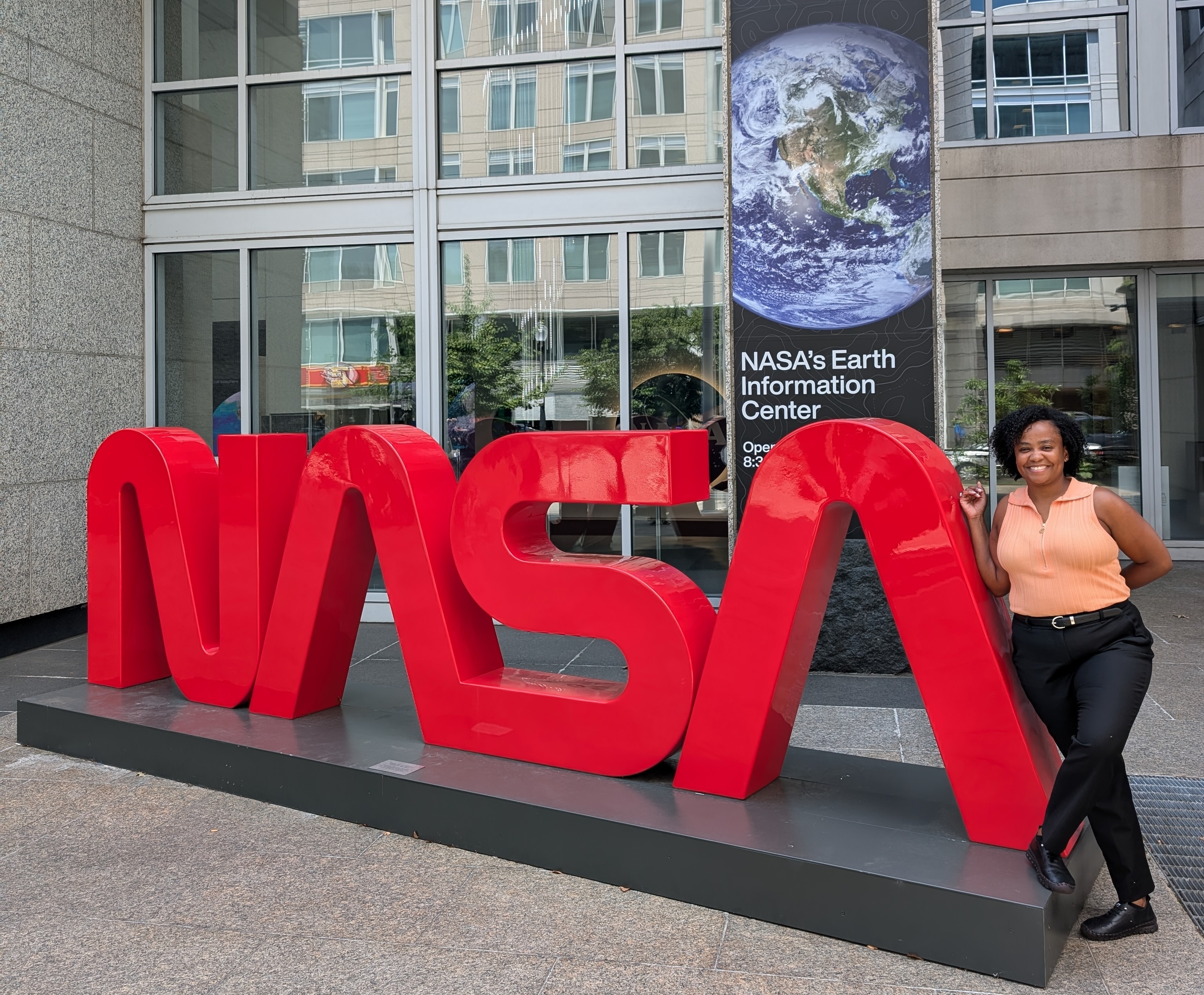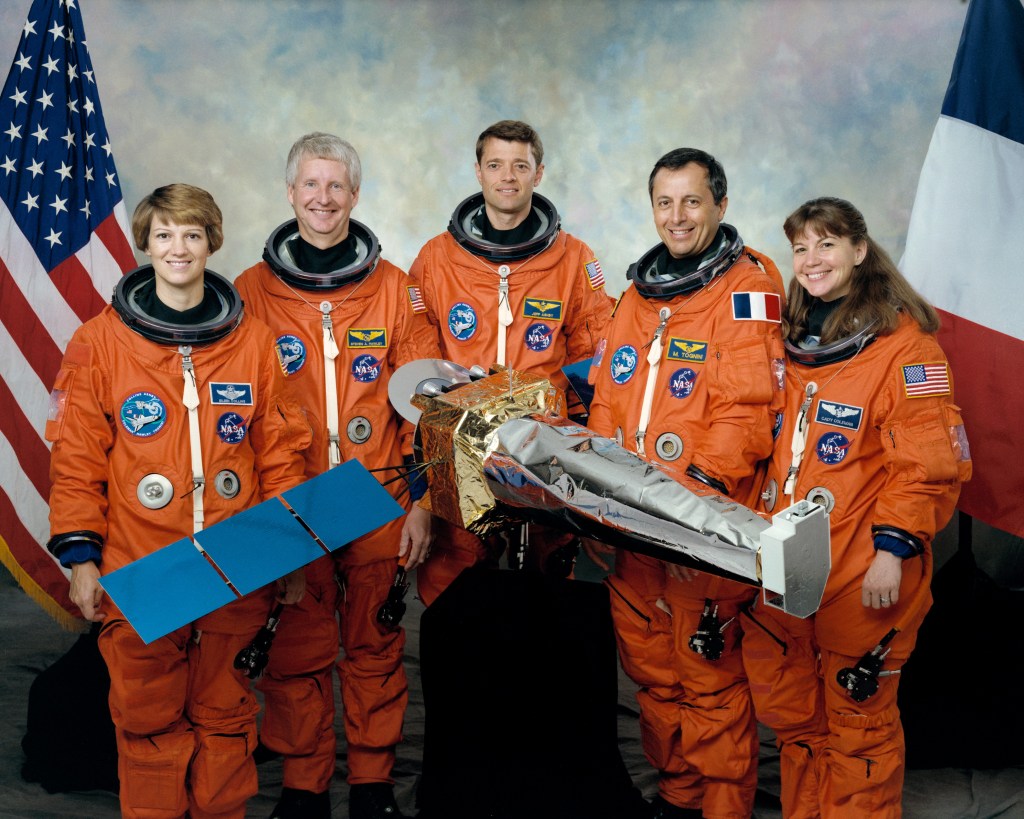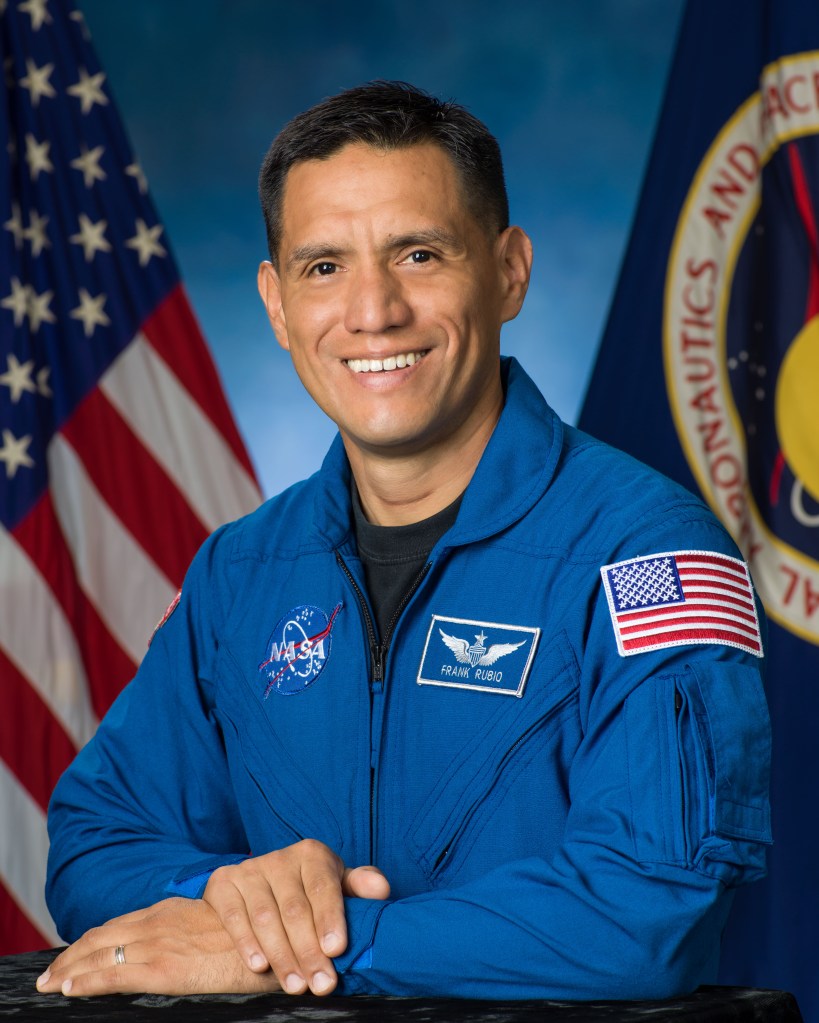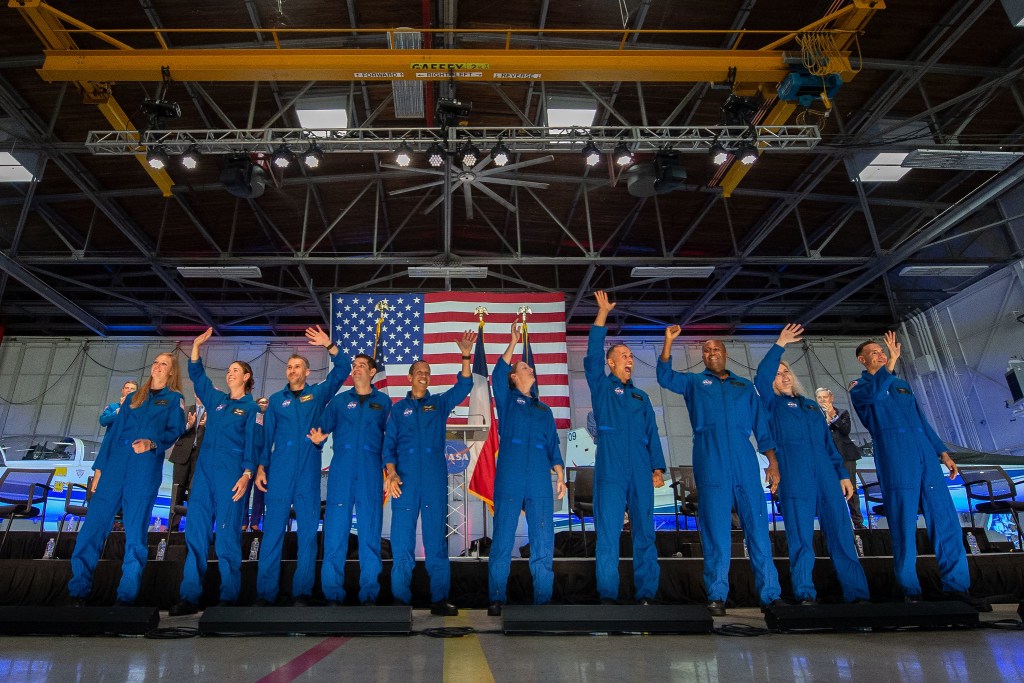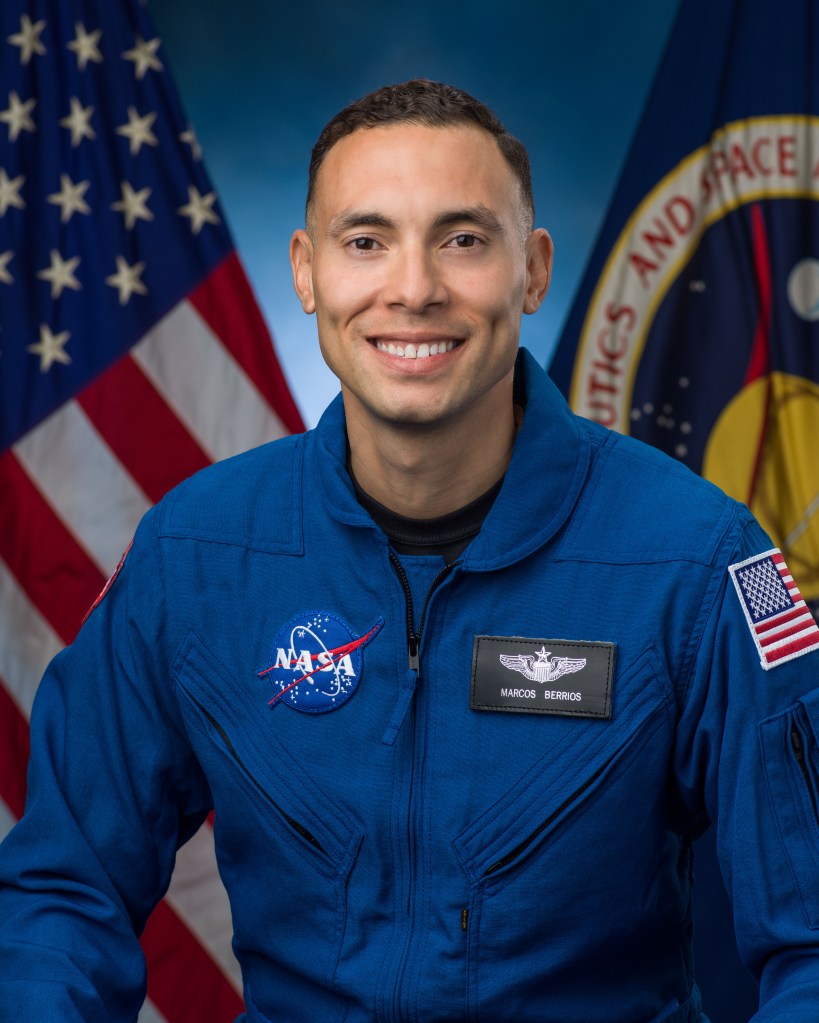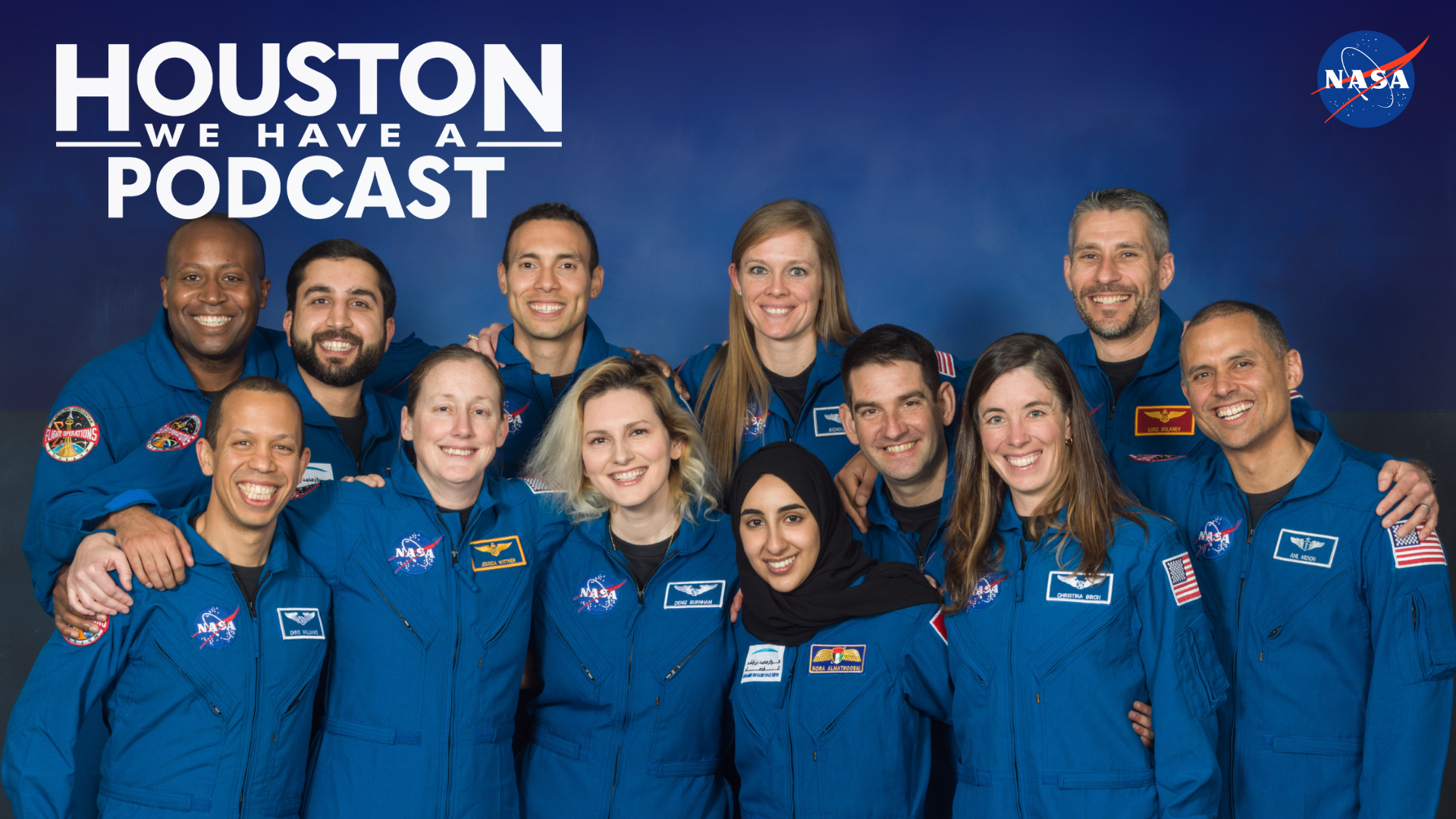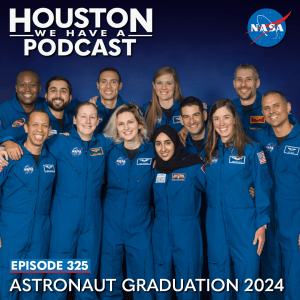
From Earth orbit to the Moon and Mars, explore the world of human spaceflight with NASA each week on the official podcast of the Johnson Space Center in Houston, Texas. Listen to in-depth conversations with the astronauts, scientists and engineers who make it possible.
On episode 325, the 2021 class of astronaut candidates, known as “The Flies,” is graduating after two years of rigorous training. Each of the Flies discuss their training and what they are looking forward to as an astronaut in the Artemis generation. This episode was recorded in February 2024.
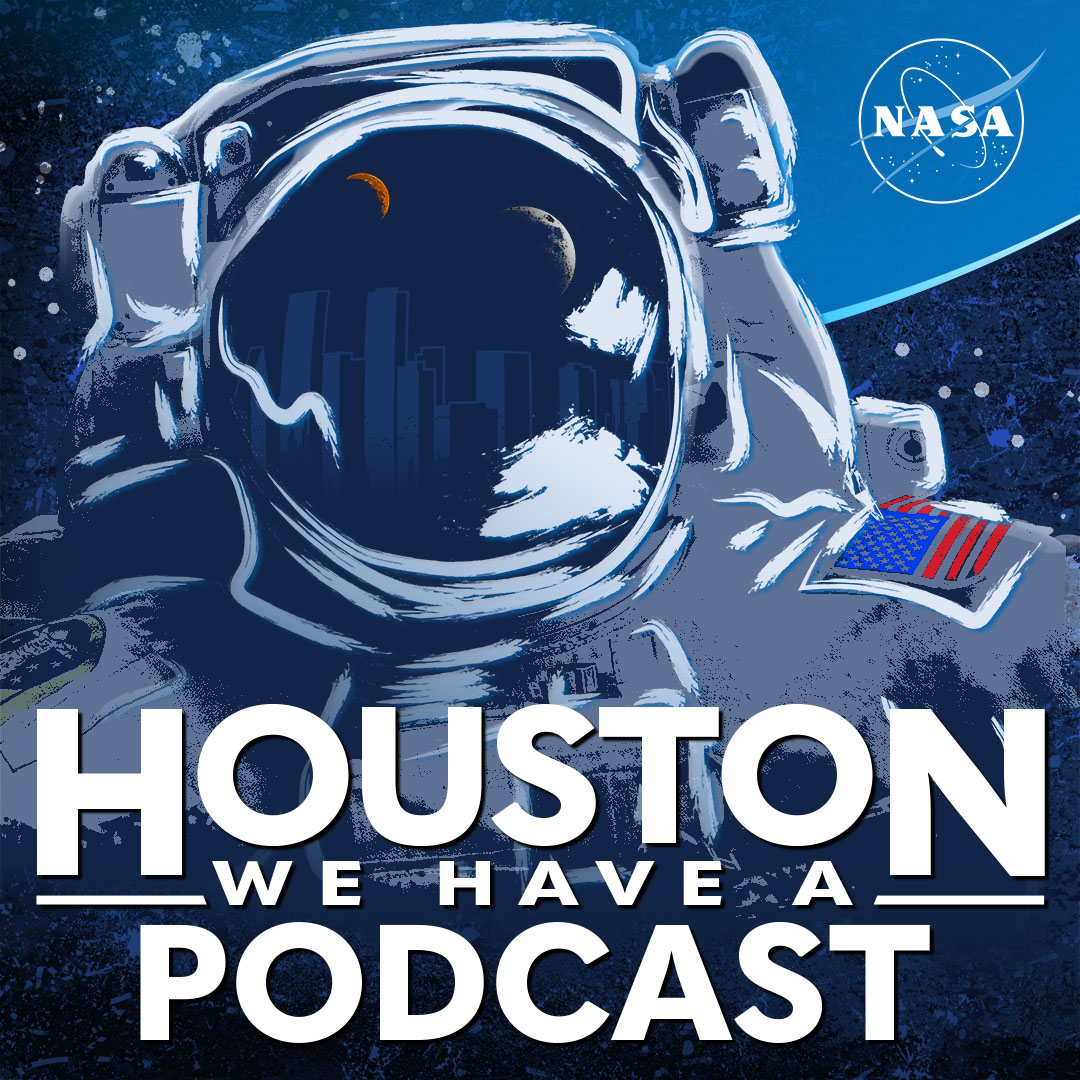
Transcript
Host (Leah Cheshier): Houston, we have a podcast! Welcome to the official podcast of the NASA Johnson Space Center, Episode 325, “Astronaut Graduation 2024.” I’m Leah Cheshier, and I’ll be one of your hosts today. On this podcast, we bring in the experts, scientists, engineers, and astronauts, all to let you know what’s going on in the world of human spaceflight and more. Our new class of astronaut candidates are about to graduate. The 2021 astronaut class who have been dubbed “the Flies,” spent the last two years undergoing training as astronaut candidates, practicing for spacewalks in the Neutral Buoyancy Laboratory, flying in T-38 jets, space station familiarization, learning the Russian language, and more. That training is almost complete, and they’ll be eligible for assignments to future missions, whether to the International Space Station in low Earth orbit, or to walk on the lunar surface through Artemis missions.
Ahead of their graduation, I had a chance to interview all of the Flies both NASA and United Arab Emirates astronauts. On this episode, you’ll hear from each of the Flies to learn a little bit about them, their training and expectations for what’s ahead as an astronaut in 2024. I loved these conversations. For your listening pleasure, here are the Flies ahead of their graduation. Enjoy.
[Music]
Host: Our first conversation is with Jessica Wittner and Andre Douglas.
Jessica is a lieutenant commander of the U.S. Navy and a native of California with a distinguished career serving on active duty as a naval aviator and test pilot. She holds a bachelor’s degree in aerospace engineering from the University of Arizona, Tucson, and a master’s in aerospace engineering from the U.S. Naval Postgraduate School. Wittner was commissioned as a naval officer through an enlisted-to-officer program and has served operationally flying F/A-18 fighter jets with Strike Fighter Squadron 34 in Virginia Beach, Virginia, and Strike Fighter Squadron 151 in Lemoore, California. A graduate of U.S. Naval Test Pilot School, she also worked as a test pilot and project officer with Air Test and Evaluation Squadron 31 in China Lake, California.
Andre Douglas is a Virginia native. He earned a bachelor’s degree in mechanical engineering from the U.S. Coast Guard Academy, a master’s degree in mechanical engineering from the University of Michigan, Ann Arbor, a master’s degree in naval architecture and marine engineering from the University of Michigan, a master’s degree in electrical and computer engineering from the Johns Hopkins University in Baltimore, Maryland, and a doctorate in systems engineering from the George Washington University in Washington, D.C. Douglas served in the U.S. Coast Guard as a naval architect, salvage engineer, damage control assistant, and officer of the deck. Upon selection, Douglas was a senior professional staff member at the Johns Hopkins University Applied Physics Lab (APL), working on maritime robotics, planetary defense, and space exploration missions at NASA. Douglas holds a professional engineering license in the state of Virginia and is a champion of youth mentoring and development through FIRST robotics competitions and Junior Achievement mentoring programs.
Here’s our chat with Jessica and Andre.
Andre and Jessica, thank you so much for being here. Welcome to Houston We Have a Podcast. We are so excited for you as you’re getting ready for your graduation. But before we get into talking about what your training was like and what you expect after graduation, tell me about the moment that changed everything when you got the phone call that you’d been accepted to be a NASA astronaut.
Andre Douglas: So I remember that call very clearly, you know, back in this time of 2021, we were doing COVID and remote working, and it was kind of tough. And we had applied for this position a while ago and it got delayed a little bit. And so when I got this phone call, I was like, “Huh, a Houston number. Oh, okay.” And I answer the call. I am working from home. My wife’s downstairs working from home. We just had our one-year-old son with us. And I’m talking to Reid Wiseman, he’s like, “Hey, you know what this is about?” And I’m like, “Yes, I do.”
[Laughs]
And eventually, we got to a point where I said yes. And I just remember feeling very, very happy and warm. And I ran downstairs and I hugged my wife and I got my one-year-old, and I was like, I can’t believe this is happening right now. It was everything that came together from my last 25 years at the time of my life to that one moment where it changed everything. And again, this was during COVID, so, you know, things weren’t that great, but that news? That was just awesome. And I was super excited and motivated to just be here.
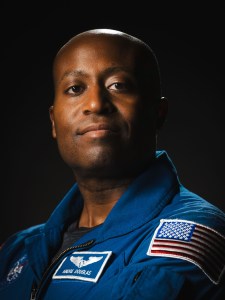
Host: That’s so touching. What about you, Jessica?
Jessica Wittner: I think maybe a little bit more funny. I don’t know, but I love your story, Andre. It’s kind of funny because I’m active duty Navy, and I was in the squadron early in the morning getting ready for a flight, and I’d set my phone down and ran in to prepare for my flight. And when I came back, I saw I had missed a call from a Houston number.
Host: Oh no.
Jessica Wittner: And I knew the phone calls were coming out, but I couldn’t believe I was like, “Oh my gosh, I don’t get spam from Houston numbers”. And so I immediately redialed the number because I was like this has to be them. So I went on the hallway, redialed the number, and sure enough, Reid Wiseman answered the phone. And I tell you, we had that same conversation, which was, do you want to be part of the next astronaut class here at NASA? And, of course the answer is yes. And it was pretty short conversation. We got a little bit of info about what’s to follow, and then from there, I was just like standing in the hallway realizing my whole life’s about to change.
Host: Wow.
Jessica Wittner: I’m so glad that he answered the phone when I called back. So, I ran, I told my commanding officer, I was like, “Hey, sir, I’ve been selected for the next astronaut class.” And we actually canceled my flight that day so I could go, you know, run across town and tell my family, too. So it was a really amazing day. You’re just riding this high the whole time.
Host: Oh my gosh. I just feel like, you know, there are a lot of life changing moments. I mean, becoming a parent, getting married, things like that. I feel like this has to be up there, one of the most life changing phone calls. That’s amazing. I’m so glad you guys are here. And I just want to know a little bit about—it’s been two years now since you joined the NASA team. What were your first impressions joining NASA?
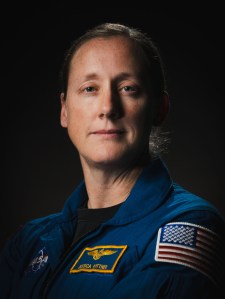
Andre Douglas: So, my first impressions when joining NASA is that it’s a very large organization, very complex. There are a lot of moving parts. I also recognize that there’s a lot of people behind this. For each of us that are going to do spaceflight training, there are like thousands of people involved. And we’re all trying to work together. We’re all trying to figure things out. And not only are we as NASA trying to do that, but we also work with contractors and commercial partners now. So it was just like, “Wow,” you know, I used to do this in my previous job at an Applied Physics Lab, but this is to the extreme on almost a U.S., worldwide level, right? International partners as well with JAXA, the Japanese Space Exploration Agency, and the European Space Agency. So, very integrated, very complex, very big. But in general, everybody’s working to help support us in human spaceflight. So it’s a really good feeling to be a part of that team.
Host: Yeah. It’s something bigger than yourself, for sure.
Andre Douglas: Right, right.
Host: How about you? Any first thoughts?
Jessica Wittner: Yeah, I think I had the same feeling that it was just stepping into something really, really big. And, you know, growing up as a kid, I followed what NASA was doing all the time, and I was that little girl who wanted to be an astronaut growing up. So, I was all over the different news articles and releases and things that came out. So just realizing, I think at that point that I was going to be part of that team and just being able to help in the missions that we’re doing. And just being able to bring like, my experience to the table and learn how to advance humanity and our journey in space. It was just a very special realization, I think that I was going to get that opportunity.
Host: I love it. Lifelong dreams. So your team, your class, was dubbed the name the Flies. How did you enjoy working with them? You know, did you have anybody who you felt was stronger in one area of training than another? I mean, you go through everything from learning the Russian language to spacewalk training in the Neutral Buoyancy Lab, you know, space station maintenance, things like that. Did you have a favorite part?
Andre Douglas: So I was going to say that I enjoyed all parts of it. And the cool thing about our class, the Flies, is that we mentioned how we swarm together. You know, we work together a lot. And the cool thing is, is we have very special skills and very unique areas that we all leverage from each other throughout different parts of the training. So I think by having such a diverse group that actually helped strengthen us to get through the training, I mean, everybody’s gone through and done well and it was very valuable to see different perspectives and to learn from classmates. I mean, it’s been great. So I feel like beyond the training, when we go through, difficult times at NASA and try to navigate this space exploration journey, we’re going to be able to lean on each other again, in expertise from different areas. We’re not just all one minded group think type folks. We’ve been able to lean on each other in areas of need. So very excited to have been part of the class.
Jessica Wittner: Yeah. I couldn’t have said it better. I think, ditto, essentially. It’s an incredible honor to be part of the class. And I think, like you said, everybody has such diverse backgrounds, and we have professional military aviators, we have professional engineers, we have, you know, doctors, scientists, we have such an awesome group of people. And everybody has worked incredibly hard to get where they were in their careers before showing up here, and now they’re bringing everything to the table and we make one big team. And so, just like you said, it’s very refreshing and awesome to be part of a team like that where, you know, you can bounce ideas and everybody maybe has a different opinion about which way we’re going to go with whatever the problem is. But you know that in the end, you’re going to come up with the, the right solution, I guess, or the best solution that you could come up with just because everybody is bringing those ideas forward. So it’s really been great.
Host: I love that. So I think I have time for one more quick question. The Flies. Are you allowed to tell me why that is your name?
Jessica Wittner: I can.
Host: If not, that’s fine. We’ll just cut that I asked it.
[Laughs]
Jessica Wittner: I mean, it’s not that crazy of a story, I guess, but so the previous class of astronauts gives the newest class their name. And so the previous class was The Turtles. So we had a gathering of the office together and then they announced our name and they named us the Flies. So we don’t, as a class, have really a say in what we’re called. Then the explanation that, at least we’re telling ourselves, is that we’re going to fly a lot. And so that’s the name. the Flies. We have so many different vehicles and everything coming online and so many different missions that are going to be available here in the future. And so they’re saying we’re going to fly pretty often, it’s the Flies. The other more funny version is that maybe turtles eat flies. So we’re not a hundred percent sure on that one, but either way, that’s where it comes from.
Host: I love it. You know, that’s great. There’s a little bit of fun in that. There you go. Well, Andre and Jessica, thank you so much for joining us today. We’re really excited to see you after graduation, see what comes up for you mission wise and all the work you’ll do here at NASA. So thank you again.
Andre Douglas: Yeah, thanks for having us.
Jessica Wittner: Yeah, absolutely. Thanks.
Host: Our next chat is with Deniz Burnham and Luke Delaney.
Deniz is a Lieutenant in the U.S. Navy, and calls Wasilla, Alaska, home. A former intern at NASA’s Ames Research Center in Silicon Valley, California, Burnham earned a bachelor’s degree in chemical engineering from the University of California, San Diego, and a master’s in mechanical engineering from the University of Southern California in Los Angeles. She’s an experienced leader in the energy industry, having managed onsite drilling projects and oil rigs for over a decade, including the Arctic in Alaska, Northern Alberta in Canada, and Texas. Burnham served in the U.S. Navy Reserves as an Engineering Duty Officer. She is a licensed private pilot with ratings in the following aircraft: airplane single engine land and sea, instrument airplane, and rotorcraft-helicopter.
Luke Delaney, a major, retired in the U.S. Marine Corps, grew up in Debary, Florida. He holds a degree in mechanical engineering from University of North Florida, Jacksonville, and a master’s degree in aerospace engineering from the Naval Postgraduate School in Monterey, California. He is a distinguished naval aviator who participated in exercises throughout the Asia Pacific region and conducted combat missions in support of Operation Enduring Freedom. As a test pilot, he executed numerous flights evaluating weapon systems integration, and he served as a test pilot instructor. At the time of his selection as an astronaut candidate, Delaney worked as a research pilot at NASA’s Langley Research Center in Hampton, Virginia, where he supported airborne science missions. Delaney executed over 400 combat sorties accruing more than 550 flight hours. Including his NASA career, he has more than 3,900 flight hours on 48 models of jet, prop, and rotary wing aircraft.
Here’s my conversation with Luke and Deniz.
Thank you both for coming onto the podcast. We’re really excited for you both, with graduation coming up and the hard work paying off really throughout your life, not just these past two years. But a little bit before we get to this work that you’ve put in during training, tell me about the phone call when you found out that you had been selected to be a NASA astronaut.
Luke Delaney: My phone call’s a little bit different I think than most, cause I was in between meetings at NASA Langley, and I had saw a phone call during the meeting and missed it and got out, and I was like, “Man, that’s a Houston number.” I don’t know what that’s called. And sure enough, they called back. I think my initial response was not expected either, which was, hey, I was excited, but I wanted to talk to my wife first to make sure we’re all still lined up for this. We had a lot of stuff going on in the family at the time and after I talked to her, I think we were thinking the same thing. I’m so glad I didn’t get those goats, because we just got chickens and we’re about to get goats, and we had this farmhouse we were doing, but we were all in. She was all supportive. And here we are.
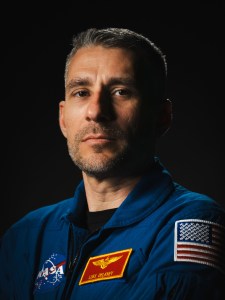
Host: That’s so funny. I mean, I guess, yeah, if you’re already at a NASA center, a call from Houston is not that alarming. But glad you didn’t get the goats.
Luke Delaney: Me too. Me too.
Host: Deniz, what about you?
Deniz Burnham: I remember that call very well. It was super early in the morning. It was around six in the morning. And so I don’t know, similarly or dissimilarly, like working in the oil field, getting a call from Houston area code is not abnormal for me. So, I saw it, it was very early in the morning, but that’s also not abnormal for me. I heard Reid and Anne’s voice, so Reid’s the chief of the astronaut office at the time, and I was kind of holding my breath. I mean, this was like my childhood dream, you waited for this moment, this call all your life, and you’re trying to protect your heart too. So you’re just like, I’m going to hear what they say first before. And they very calmly say, “Hey, we just wanted to know if you’re still interested.” And I was like, what? What? I was quite emotional actually. I did, you know, cry and then I kind of thought about their perspective, like, oh, they’ve got to listen to this. So it made me laugh actually. So I’m like laughing at the same time. And the thing I thought to say to them was like, okay, cause I knew my reaction was probably pretty interesting to them. I was like, oh, you know, no takebacks. I heard a yes. And that means I’m in.
Host: Oh, wow. Those are great stories. So joining NASA, any first impressions?
Luke Delaney: You know, I think my first impression—because I came on NASA Langley first—was getting exposure to some of the airborne science and just what that section of NASA is doing. I had no idea, just the extent of kind of environmental and atmospheric research and how we’re really further defining what the planet we live on. So when I saw that, and now I see the space exploration side, it’s just amazing what NASA does. Such a diverse set of operations. So just really an eyeopener for me.
Deniz Burnham: Yeah, I’d say my first impressions, I was a former NASA intern at NASA Ames. And that internship for me was such a wonderful experience too, because I was like, you know, hey, even if I don’t become an astronaut, I always wanted to be a part of NASA. And actually getting to be an astronaut candidate here, just walking around and getting to interact with so many people, you realize what goes into everything. There are so many people involved to make this as kind of successful missions. So that was my first impressions.
Host: Yeah, we were talking about that with Jessica and Andres, too. How there are so many people that work these missions, you know? And it’s kind of behind-the-scenes work, so you never see it. But it is amazing. I was a NASA intern too.
Deniz Burnham: Oh, very cool.
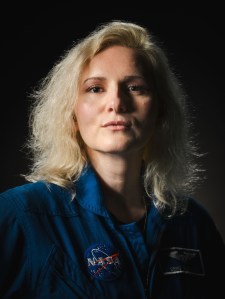
Host: Opens a lot of doors. Let’s see. Let’s talk about your training. Was there something that surprised you during your training? Something that you weren’t expecting? Or did you really think it was all by the book?
Luke Delaney: I mean, I don’t know if I was surprised so much as I knew there’d be a geology aspect to it. But just the fact that we did like two extensive trips in the field for fundamental geology skills. And we took those and we looked at how they applied to Moon and Mars and pretty good detail. I was just really shocked that we had that level of training. So it did surprise me in some aspects, I guess.
Host: That sounds so fun. And I love that, you know, when you think about, you really may be holding Moon rock someday, and thinking back to that training and everything you’ve learned in the field. So pretty cool.
Luke Delaney: Yeah. It’s unbelievable.
Host: Did you have a favorite part of training?
Deniz Burnham: I’d say the favorite for me, just in terms of like a core memory, getting to try on the suit for the first time. It’s something that you always picture in your mind. As a child, you know, you try to see yourself in the suits because you get to see all these pictures and then you actually get to try it on for yourself. And it was pretty incredible.
Luke Delaney: Oh, can I change my answer?
Host: Go for it.
Luke Delaney: No, I’m just kidding.
Deniz Burnham: I would say the same exact thing every time. We’re actually office mates too, which makes this wonderful.
Host: Oh yeah. You guys have spent a lot of time together, I’m sure. So let’s talk about your class, the Flies, you know, what is it like joining this experience with these people who are really kind of like new family for the rest of your life? What’s it like going through training with them? How did you work together and bond?
Luke Delaney: Well, we started off as Flies, but I think we ended up as a swarm. And that’s kind of our—maybe that’s cheesy—but that’s kind of what we ended up doing. We institute, I think, early on, this team care philosophy and supporting each other. And anytime somebody’s having any challenges, you’ve got 11 other Flies that are coming over to help. And we saw that throughout some of our survival training, some of our other field training out in Wyoming, spacewalk training. There’s challenges throughout and you got a bunch of teammates ready to help.
Deniz Burnham: That was also a part of the philosophy of the class too. We try to do it with a smile, try to make each other laugh. We’re in it for the long run. So, it definitely is important to get along.
Host: What are you looking forward to as an astronaut?
Luke Delaney: I mean, in the near-term, I’m looking forward to supporting spaceflight operations. So we’ve got a lot of the training, but now we get to apply some of that in different capacities, whether it’s in mission control, assisting the crew, or maybe even just the families. Cause you’ve got folks on orbit, you’re supporting everything here on the ground as best you can. So I think I look forward for that in the near term. In the long term, that waiting for that flight assignment and seeing what it’s going to be, it’s just an exciting time right now.
Deniz Burnham: Yeah. Luke nailed it, for sure. I think we’re all just eager to support the office now in any way we can. Ultimately, we’ll be waiting for our flight assignments too. And then the training will kind of always continue the rest of our careers.
Host: Yeah. You touched on a couple of things I was going to ask about. So after you graduate, you know, you’re probably not assigned to a mission immediately, and all the astronauts have jobs, you know, most members of the public see them when they’re flying. But what are some of the jobs that astronauts have when they are not assigned to a mission?
Luke Delaney: We have a lot of folks in the exploration department that are kind of looking at these new developmental systems and vehicles, and how are we going to tie everything together. Does it make sense from a crew perspective as an operator? So I think giving the office a chance to give feedback to those designs as much as you can and make those work for us for future exploration is just going to pay tons of dividends.
Deniz Burnham: Then supporting current operations. So the ISS and commercial crew programs. As Luke had mentioned already, opportunities to become a capcom and work in mission control. But the training always kind of continues. You have to maintain your proficiency. So the training we just received gets you to a certain point. So now you’re required to maintain that proficiency or build upon it.
Host: Okay. And how does that training continue, you know, to make sure that your skills stay sharp before you start really training for a dedicated mission?
Luke Delaney: Well, everybody loves the T-38 flights, and that just puts you in a dynamic environment every time you’re up there. You’ve got to make decisions quickly, you’ve got to assess situations. So I think that’s a great training tool for how we need to operate. But you’re going to have those NBL runs that you’ve got get in there. You’re developing procedures for those on orbit to execute and contingencies or just for a regularly scheduled EVAs. So that helps keep us proficient, keeps us engaged with what’s happening on orbit.
Deniz Burnham: Yeah, exactly. And you also maintain your language prophy proficiencies and kind of like the robotics training. You get to continue that on and become like from an operator level to more of a specialist level. And so just kind of further refining our knowledge.
Host: Do you have any advice for people who want to be astronauts?
Deniz Burnham: I do. I think that the one thing I would say to anybody that’s aspiring to be an astronaut is truly, I mean this, try to be your own person. There are so many skill sets and backgrounds that are ways that could lead to this. And if I use my own background as an example, I only kind of saw it in the movies, right? Where somebody went from an oil rig to becoming an astronaut. So it’s how you articulate your skillset though, right? So kind of focus on something that other operators will recognize. You know, working in remote locations, making time-critical decisions that’s not unique to anyone’s skillset, right? That’s spread across so many industries. So try to find what makes it similar, right? Rather than just being a specific matching a one-for-one biography.
Host: That’s really good advice. Do you have anything, Luke?
Luke Delaney: Yeah, I mean, Deniz got a great perspective on that. For me, it was growing up not knowing what path to take to get there. Like, how do you even get to be an astronaut? I wish I think I had the advice back then is you don’t need a definitive path. It’s just follow your passion, take advantage of opportunities, be good at what you do, and just look for that next step. Like, what’s next? What’s next? And I think you’ll get there. That’s just how it plays out.
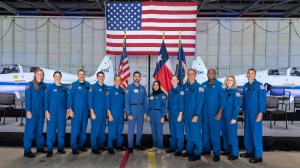
Host: Did you have anybody in the astronaut office that’s in the astronaut core that was a big mentor or somebody who really encouraged you? Or was your go-to during your training?
Luke Delaney: Yeah, we had mentors throughout different phases of training for the specific flow they call it, kind of the training flow. And I know Jenni (Sidey-Gibbons), she was a great mentor. I think as we went through the EVQ, the EVA kind of spacewalk training flow just having somebody there consistently knowing where we were either having issues or challenges being able to reach out to, and she would even resource other astronauts in the branch if she knew who was more skilled or has more experience in one area. So Jenni was a great resource there.
Deniz Burnham: I would say one thing that’s pretty awesome about the office is you can lean on anyone. If you send them a message, it doesn’t really matter. I feel like anybody would reply in a positive way that they would make time for you to bounce ideas or, you know, maybe talk about different techniques that work for different people, depending on, like Luke was saying, whatever flow you’re in. So definitely the office is close and people are willing to share advice.
Host: That’s awesome. Let’s see here. Do you have any funny stories about your group, the Flies? Anything that you want to share? I mean, I know you’ve probably not had any fun at all these last two years, right?
[Laughs]
Host: I’m just kidding.
Luke Delaney: I mean, I remember being in survival training in the Army early on where we just really didn’t know each other really well. And waking up in the middle of the night with either coyotes in the background or a screech out and some folks never heard that before. So they were like, “Oh my gosh, we’re about to be overrun by something.” Do you remember that? Cause we were in the same group. It was something like that. We’re like, “Oh, what is happening?” I go like, oh, there was an interesting time cause we really didn’t know each other who had different backgrounds quite yet, or what the personalities were in a lot of detail. So I think that was interesting just cause that was our first kind of immersive team event.
Deniz Burnham: Yeah. That’s great, definitely a core memory for a lot of us.
Host: What would you tell yourself, you know, your younger self when you’re here, you’re in this position, you’re almost finished with your astronaut candidate training. If you could go back to any point of your life growing up, what would you say to yourself?
Luke Delaney: I mean, I would say as a kid watching space shuttle launches and just sitting back in awe, how are people going out to space? I don’t understand this but knowing that it was something I was interested in, I would say tell myself, “Hey, just follow your path, follow your own path and you’re going to get there.” I think I spent a lot more time just trying to define a path where it was not necessary. So just follow your own path.
Host: Yeah. Walk through the open doors. Deniz, anything you would tell your younger self?
Deniz Burnham: I would tell little Deniz I’m so happy that she didn’t give up. That it ultimately, in the end, it is worth it. That the good times, the bad times, kind of part of the life experience, right? But sticking with it, don’t be afraid to pivot either your hobbies or your career. I think it’s important to be flexible and willing to adapt, try new things. I guess, ultimately, I would just tell her, “Hey girl, I’m glad you stuck with it.”
Host: I think we have time for one more question. I know these are kind of philosophical, maybe deep life questions, but, what’s a lesson you learned during your training that you feel like is bigger than being an astronaut? Something that kind of applies to life as a whole?
Luke Delaney: I was really inspired by people within the Flies, within the team, overcoming some challenges that just seemed, I think, insurmountable to them in certain environments. Maybe they hadn’t lived in the woods or in the wild for 10 days and crossed the continental divide or done stuff like that. And just watching people kind of take on maybe some of their fears or some of those physical challenges was really inspiring. And we saw that, I think, through a lot of different flows, even flying in the jets and doing the spacewalk training. You hit challenges and as a team, you just overcome them. So that was inspiring.
Deniz Burnham: I think in a larger context, you’re allowed to be human. You don’t have to be perfect at all times. It’s much more important that you learn and continuously improve. So sometimes it might take multiple attempts to figure something out, but ultimately what’s most important is that you become a good team member and that you do figure it out.
Host: Well, that’s all the time we have today with you two. And thank you so much for joining us. I can’t wait to see you both on the launchpad someday and remember that we were sitting here. Congratulations.
Deniz Burnham: Yeah, thank you so much.
Luke Delaney: Thanks.
Host: Nichole Ayers, who is also known as “Vapor,” is a major in the U.S. Air Force and a native of Colorado. She graduated from the U.S. Air Force Academy in Colorado Springs in 2011, with a bachelor’s degree in mathematics with a minor in Russian. There, she played Division I college volleyball all four years. Ayers also competed internationally on the U.S. Armed Forces Team while pursuing her master’s degree, which she earned in computational and applied mathematics from Rice University. Ayers is an experienced combat aviator with more than 200 combat hours and more than 1,400 hours of total flight time in the T-38 and the F-22 Raptor fighter jet. One of the few women who flew the F-22, in 2019, Ayers led the first ever all-woman formation of the aircraft in combat. Here’s my chat with Nichole.
Nichole, thank you so much for joining us here on Houston We Have a Podcast.
Nichole Ayers: Yeah. Thanks for having me.
Host: Before we get started about what this training’s been like the last couple of years, I want to know a little bit about how the journey began and your phone call that you received telling you that you’d be an astronaut.
Nichole Ayers: Yeah, I have a really special story. I was actually in Florida visiting my twin sister and she has three kiddos that I’m super close with. So we were on our way back to their house from Florida to South Carolina, and we did a girl’s car and a boy’s car. So it was my sister and I and my niece, who was five years old at the time when I got that phone call. It was such a twin thing, you know, I reached over and grabbed my sister’s arm, and she knew what had happened before I even answered the question of whether or not I wanted to be a part of the class. You know, she’s crying and I’m crying and hang up the phone. And Maddie in the back is like, “Why is everybody crying?” And then she found out that, you know, I got the phone call and I’m going to be an astronaut. And then my favorite part of that is when we got home, the boy’s car had already made it. And my two nephews come over and I have this vivid memory of the back of the SUV opening up and Maddie sprinting out of the car, “Aunties going to be an astronaut!” And my biggest nephew jumped so high, I thought he was going to hit his head on that on the back door. So she totally stole my thunder, but I couldn’t imagine a better way to do that.
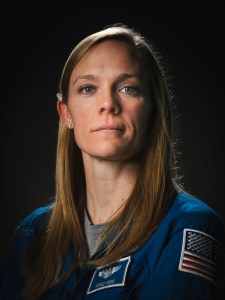
Host: Oh my gosh, that’s so sweet. I love that so much. So you moved to Houston. What are your first impressions joining NASA?
Nichole Ayers: Oh, man. It is such a close-knit team. It’s been pretty cool. You know, I talked about this earlier, but the astronaut corps kind of took us under their wing and, you know, we’ve got mentors in the astronaut corps, and then also we just have this amazing group of 12 human beings. And we all value team care so much that it’s like I’ve joined this new family and I’ve gotten to know so many people from so many different walks of life. It’s been pretty awesome.
Host: Tell me about the Flies. Tell me about how you’ve bonded and just any fun stories that you have or what it’s been like training with everyone.
Nichole Ayers: Yeah. It’s been pretty awesome. You know, like I said, we’re all from different spots in our life, right? We’ve got a vast age gap between the youngest and the oldest, and we’ve got people with kids, without kids. We’ve got married, you know, recently married. But we’ve also got engineers and scientists and medical doctors and pilots and test pilots and all, it’s been one of the coolest parts getting to know everybody. But I think it really shines in the Neutral Buoyancy Lab when we’re working together. There was this group of four of us, we split into groups and went through together. And the four that I was with, the three other guys that I was with, man, we worked so well together, we could solve any problem in the pool. It was pretty fun. But then like outside of training, you get to know everybody on a personal level and everybody’s funny. We have a really funny group, and we love to have fun.
Host: But you’re used to working on teams. You played volleyball. Can you tell me about that? I know you have a really good support system with your volleyball team.
Nichole Ayers: Yeah, I do. So I played volleyball at Air Force Academy and there were seven of us that graduated together on that team. Then there were a couple that were older than us, and just super tight-knit group. They were the ones who crashed the announcement a couple years ago in December when they announced our class. And actually, they’re coming back to Houston for the graduation, so I can’t wait to see them again.
Host: That’s incredible. That’s so much just dedication and love and support. How does that teamwork translate? You know, you’ve been with them for several years and building communication and bonds with them. How does that translate into what you do now as an astronaut?
Nichole Ayers: Pretty seamlessly, actually. Being a good teammate is kind of the biggest piece of advice that I give people, you know, work hard being a good teammate, and everything’s going to fall in line. And that translates straight from a volleyball court or a basketball court, or football, whatever you do, you know, it translates right to what we’re doing. We’re going to be in a small space for a long time together, working together. And if you’re not a good teammate, it’s not going to work out. So I think being part of a team really set me up for success as well.
Host: You have spent the last two years training to be an astronaut, and that involves a lot of different disciplines and a lot of different skills. Was there something in there that surprised you? Was there anything unexpected from what you thought you would experience coming into this program?
Nichole Ayers: Ooh. I like to say that I cheated because I flew T-38s in the Air Force, and I was an instructor in T-38s. And then I also minored in Russian at the Air Force Academy and spent a semester abroad.
Host: Oh, you already had a lead out?
Nichole Ayers: Yeah, so I showed up. Everyone’s like, great, you know, already done with this. So I showed up not crying about having to learn Russian, you know, cause it’s a difficult language. And I did not envy my classmates having to learn that language as an adult, you know? So yeah, I like to say I cheated. But I will say that the Neutral Buoyancy Lab is challenging, right? You’re in your own suit, which I would call a craft. You know, it’s like your own middle spacecraft. You’ve got to learn all the systems of it. You’ve got learn how to work in it. It’s not meant for human bodies, right? In terms of the joints and where they’re placed, you’re like a robot out there trying to maneuver and execute the tasks. It’s just you and your partner out there working through the challenges and then working through the timeline and getting back into the airlock safely and getting the hatch closed. It’s a lot. It’s super challenging, but it’s also been the most rewarding part, I think.
Host: And I think it’s also really beneficial that you came in with that training. You know, you had already been flying T-38s and you mentioned you knew Russian too, so I’m sure you were a go-to for a lot of your classmates in those fields. Did you feel like anyone was a go-to for you in any other fields or parts of your training?
Nichole Ayers: Oh, man. I talked about the group and the NBL already. I think that a lot of people bring different perspectives. And so it was really cool to lean on other people for how they’re going to solve that problem, because I have one way of solving it. The test pilot next to me has a different way of solving it. The scientist for sure has a different way of looking at life and solving that problem. So it was really cool to lean on the people that I don’t normally hang out with, right? I’m military by background, hang out with pilots my whole life, right? And so leaning on the people with different academic backgrounds and different mindsets really helped.
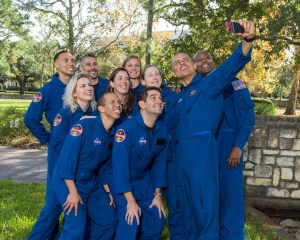
Host: So when you graduate, you don’t have an assignment just yet, but what are you most looking forward to when you get an assignment? When you actually get to go to space? What do you think you’re most excited about?
Nichole Ayers: Oh, you know, we’ve talked a lot about teams, and you go up as a four-person crew or a three-person crew depending on the spacecraft that you’re on. I can’t wait to meet those human beings and start training and working with them.
Host: Do you have any advice for people who want to be an astronaut?
Nichole Ayers: Oh yeah, of course. I would say just be you. Go find something that you’re excited about, you’re passionate about, and go do it. It doesn’t necessarily take one career path to get here. Then again, work hard and be a teammate and everything else is going to work out for you.
Host: I love that advice. And I’ve heard that from different astronauts recently and through the years of just finding something that you love and that you’re passionate about. Because it is hard to be selected to be an astronaut. But if you’re already doing something that you’re passionate about and it’s not just for this end goal in mind, then you’ve already spent your life working towards something that you love and that you believe in. So I think that’s such good advice to anyone who wants to be an astronaut.
Nichole Ayers: Yeah. You want to be happy in your career, even if you don’t get the job right. That’s the big thing, is what I would say is just be happy. Be really good at it, you know? And NASA wants to hire the experts in every field that they can possibly find.
Host: Yeah. What would you be doing right now if you weren’t an astronaut?
Nichole Ayers: I would be flying the F-22. I would probably still be in Alaska doing it. It’s a gorgeous place to fly. We sit alert there. We protect the entire Western coast from Alaska. I would be, again, loving life in my career. That was the point, just fly enough 22s.
Host: So you’ve broken the sound barrier how many times?
Nichole Ayers: I don’t know if I could count. I’ve got like, you know, over 600 hours in the Raptor and over 500 hours in the T-38, you know, hundreds of times.
Host: That is a bucket list item for me. I just want to break the sound barrier just once. It’s fine.
Nichole Ayers: It’s a little more anticlimactic than you would think.
[Laughs]
Host: So I’ve heard. but I’m keeping my hopes up though.
Nichole Ayers: I’m excited to potentially go 25 mach one day though.
Host: Fingers crossed. What is a lesson you learned during training that you think is bigger than being an astronaut? So something that applies to your whole life.
Nichole Ayers: You know, we’ve hit on teamwork a lot. I think being team care is just huge. But one of the things that we didn’t talk too much about is the outreach and the inspiration for little kids. You know, one of my favorite parts of this job is talking to little kids and getting them excited and fired up about STEM. And getting them excited to go make a difference in the world and go find something that they enjoy doing.
Host: Well, let’s take that a step further. If you could talk to yourself, a younger version of you, what would you tell yourself?
Nichole Ayers: That’s always a tough question. Don’t change, right? I knew what I wanted to do since I was a little tiny kid. I’ve had this astronaut dream, you know, I’m like the little serious kid that never grew out of a dream and never stopped working on it, and just kind of never got bumped off the path toward it. So I would say don’t change. Just keep doing what you’re doing. I loved math as a kid and so I would say just keep doing exactly what you love.
Host: That’s sweet. I think we have time for one last question. You’ve got a great support system and you also mentioned that phone call that you got and your nieces and nephews and their excitement for you to be an astronaut. You’ve been in this program for a couple of years now, it’s really real. What do they think?
Nichole Ayers: Oh, man, they’re so excited. I’m pretty sure my niece is going to steal the show with a pink astronaut suit at the graduation. She did at the announcement. But, you know, they’re at this age where they’re starting to figure out what they like and don’t like, and they’re starting to really lean into some STEM stuff and they’re excited about building things. And they’re asking me all sorts of questions and they cannot wait to see what I’m doing in the future, you know, where we’re going. And they love to, they came out and saw me at a—I happened to stop through an airport near their house—and so they got to come see the T-38 with me and that kind of stuff. So they drop everything to come and just ask questions and talk to me.
Host: That’s incredible. Wow. I’m so excited for you. And thank you again for joining us on the podcast today. Cannot wait to see you up in space floating around doing some work.
Nichole Ayers: Yeah. Thanks for having me. Appreciate it.
Host: Our next talk is with Marcos Barrios, a major in the U.S. Air National Guard, who grew up in Guaynabo, Puerto Rico. The test pilot holds a bachelor’s degree in mechanical engineering from the Massachusetts Institute of Technology (MIT) in Cambridge, Massachusetts, and a master’s degree in mechanical engineering as well as a doctorate in aeronautics and astronautics from Stanford University in Palo Alto, California. A distinguished pilot, Berríos graduated from the U.S. Naval Test Pilot School in Patuxent River, Maryland and has accumulated more than 110 combat missions and 1,400 hours of flight time in more than 21 different aircraft. Here’s my chat with Marcos.
Marcos, thank you so much for joining us today. We are so excited to have you on the podcast. You know, this is the culmination of really two years of training for you. How are you feeling?
Marcos Berrios: I’m extremely excited to be on Houston We Have a Podcast. I’ve been listening to this podcast for several years now.
Host: No way.
Marcos Berrios: So it’s quite exciting to finally be a part of it.
Host: That’s awesome. I love hearing that. So before we talk about the training that you’ve done the past couple of years, I want to talk a little bit about how your journey started. With that phone call, the iconic phone call, you know exactly what I’m talking about. You probably received thousands of phone calls through your life, but this is the one, so can you tell me about that?
Marcos Berrios: I can. So after the second round of interviews, we had quite a long wait before we got the phone call. And so during that time, I would spend a lot of time looking up different videos and talks from astronauts themselves to kind of just try and stay motivated. I just wanted to be immersed kind of in that world to kind of keep my hopes up, stay excited. And so that day, I’m a wake-up at 4:30 in the morning type of person. And so I woke up early, I was working out in my garage, very quiet, very peaceful. And I was actually listening to Reid Wiseman, who was the chief of the office at that time, and the head of the board talking at a space symposium. And so for about an hour, I was just listening to his voice the entire time.
Next thing you know, I’m done with my workout. I get ready for work, I’m driving into work, I get a phone call and I see that it’s a Houston area code. You know, I initially thought I was going to be extremely nervous, but I wasn’t. It actually felt very calming. I hit answer. And the next thing you know, I hear Reid’s voice over the phone, the same voice that I had heard all morning long. And so can’t make that up. And I don’t remember exactly how it went after that. They asked if I wanted to join the new class of astronauts. I said yes, and maybe there was some chitchat back and forth. A bit of banter, I think. Then I continued my drive to work.
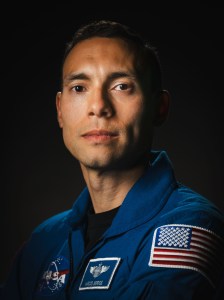
Host: Oh my gosh. And you had to pretend like the day was normal after that.
Marcos Berrios: Yeah, that was very hard. Yeah, that was hard to do. Just put it that way.
Host: I think I’m a good secret keeper, but I don’t know about that one.
[Laughs]
Marcos Berrios: Some people may or may not have found out, but it’s our secret.
Host: And the world’s now. Are you the first astronaut from Puerto Rico?
Marcos Berrios: I am not actually. Joe Acaba, our chief astronaut, is from Puerto Rico.
Host: That’s right. Do you guys have any special bond and you’ve been able to connect through that?
Marcos Berrios: Do we have special bonds? The one thing I will say about Joe, when I got selected, he did call me. So I thought that was very special. Of course, I’m a huge fan of Joe, being from Puerto Rico. I followed him very closely. And so he called me to congratulate me. He called me to tell me that even though I didn’t know it, that I would be making a large group of individuals, people, extremely proud. And so that was very special. And so I really appreciate that from Joe. That’s kind of the person he is.
Host: That’s really thoughtful. And you have to be making so many people proud, you know? I mean, beyond just your family and friends, but I’m so happy for you guys.
Marcos Berrios: Appreciate it.
Host: So coming to NASA, what are your first thoughts when you get here, you know, did you have any big first impressions?
Marcos Berrios: Big first impressions? I actually worked at NASA Ames for almost my entire adult working career. I worked for an Army research group within the NASA Ames premises. So I was kind of engulfed, or immersed, a little bit within NASA culture. Although every center, I’ve realized now that part of our trainings actually, we go visit the various centers around the country. And every center has their own personality. So NASA Ames is very different than Johnson Space Center. So I was extremely excited to be a part of a center that focuses on kind of the human space exploration aspect to the NASA mission. And I was extremely excited to not only learn about the operations and what we do on the space station, but there’s a lot more that goes on that I didn’t realize at the Johnson Space Center. And it’s really neat to just be a part of something a lot larger than yourself and to be able to just contribute a little bit to the overall goal.
Host: Let’s talk about the Flies. This is your class. And you’ve spent two years and a lot of time over those two years with these people. What’s that been like?
Marcos Berrios: I have spent a lot of times with these individuals in close spaces, confined spaces, not smelling the greatest, but let’s see, the Flies. I think we’re an interesting bunch. I think we all have different backgrounds. We all have different personalities, but I think that’s what makes us special. And of course, I’m extremely biased. I would say the unifying characteristic, for me at least, is that everyone’s extremely kind human, which I think is important, not only when you’re working together as a team to accomplish some sort of event or mission, but I think that also lends itself well to supporting each other in our personal lives.
Host: So you’ve been training the last two years. How was that? Was it everything you expected? Did you have any surprises in there?
Marcos Berrios: I honestly didn’t know what to expect. I mean, that’s not entirely fair. You know that training consists of flying, of learning Russian, and of learning about the space station. But aside from that high level kind of summary, I didn’t really know the kind of the intricacies and the details.
What I liked most about training was the variety of disciplines that we covered during these two years. If it was up to me, I’d continue in school probably forever. I really enjoy learning new things, and I really enjoy learning new skills. And so the fact that I got to learn a new language, Russian, the fact that I got to learn about geology, I got to spend two weeks on the field with my classmates picking up rocks, identifying rocks, making up stories about how the mountains around us formed, how the oceans and various geological features was extremely fun. We did an outdoor leadership course. I did that with the majority of my classmates. It was a special experience where we got to share personal stories and we got to bond, which I think made us a lot of closer and certainly better teammates and better followers for the future. So my favorite part of training was just all of the different disciplines and all the different skills that we were exposed to, and we got an opportunity to learn.
Host: I want to hone in on a word you just said. You mentioned that you became better followers. And I think that’s so important because, you know, NASA astronauts are definitely leaders, but there are times when you have to learn when to let someone else lead and be a good follower. So, do you have any other insight on that? And any advice you can share for people on what it means to be a good follower?
Marcos Berrios: That’s such an important topic, in my opinion. And we were very lucky to have an entire team whose focus is to make us better followers, better leaders, better humans. It’s the Behavioral Health and Performance team. And so part of our training focuses on that aspect. And so for most of our events, there were structured, say, roles that we had to fill or play. So we went to geology every day. We had a leader, and then the remaining individuals of the team were followers. And they structured that in a way and exposed us to different scenarios, different disciplines, that allowed us, or really forced us, to be a follower and exercise those skills.
I would say the majority of us probably have a good five to 10 years of experience before being an astronaut, working in an area of our expertise. And it’s not always the case, but I would say in general, leaders are subject matter experts in their field, in that discipline. And the situations that we were put into during astronaut training, or as leaders, we were not experts in the fields that we are. None of us are geologists. None of us have done spacewalk training, or none of us have led an expedition in the mountains.
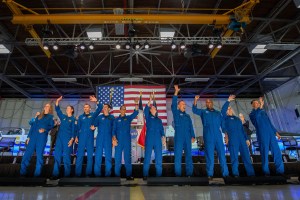
Host: We’ve got time for a couple more questions.
Marcos Berrios: Alright. Let’s do it.
Host: What was your favorite part of training? Do you feel like there was something that you really excelled at?
Marcos Berrios: I really enjoyed the spacewalk training. My guess would be that that would be the majority of our answers. Spacewalk training, not only was it mentally challenging, it was physically challenging, but it was also probably the closest thing to being an astronaut that we did these past two years. When you think of being an astronaut, you think of being in a spacesuit, at least I think of doing a spacewalk. And so, I think that part of training was extremely special. I think we all love challenges. So it was a challenge, but it was just so much fun. And we got to do it in a group, which is actually very helpful too. So I had Nichole Ayers, as well as Luke Delaney and Mohammad in my group. And so we spent eight months—I would say about eight months—working very closely together. And it was probably the best experience during these past two years for sure.
Host: Wow. I feel like you get out of the NBL and you feel so accomplished. You know, you go home and you’re like, I practiced spacewalking today.
Marcos Berrios: You know, that thought comes maybe the day after. I mean, after I get out of the pool, I am, of course—we’re probably our own worst critics—I’m exhausted. I’m like, “Oh, my back hurts. Oh, my hands hurts, my fingers hurt.” But it’s funny you say that. I probably say those things, but with a huge smile right on my face. And so maybe internally I’m like, “Wow, that’s probably such an amazing experience.” The next day, you certainly feel that, and certainly as you reflect upon kind of the training you do. I think when you’re going through training as anything else, you know, you’re being evaluated, you’re being assessed. So you always have that constant, what could I have done better? Or I messed this up, or perhaps, this area that I worked on was a success. And so maybe it’s a mix of emotions, but overall, yes. I mean, talking to you right now, I think about those training runs, and I think about how cool and awesome and fun that was as opposed to the details. And you know, what I could have done better.
Host: I’m going to squeeze in one more question. What are you most looking forward to about being an astronaut?
Marcos Berrios: What am I most looking forward to about being an astronaut? I am extremely excited about contributing to the Artemis mission in my current role. So right now, my technical assignment is to work on the human landing system. And so I get to interact with the entire NASA team who’s with SpaceX and Blue Origin. That’s an area that’s extremely exciting to me. It aligns well with my background as an engineer, as a helicopter pilot. And so I’m extremely excited about that part of it. Of course, I’m extremely excited about contributing to the science on the space station. I’m extremely excited about learning more about the NASA enterprise as a whole. Again, I could be a learner or in school forever. So it’s extremely exciting to have the opportunity to talk to the experts in the field of geology, to the experts in the field of astrophysics, radiation. So I’m just excited to, I guess, just be a part of NASA in general.
Host: Well, we’re excited for you. From podcast listener to guest, thank you for joining us today. Can’t wait to see what you do.
Marcos Berrios: Thank you. Appreciate it.
Host: We’re back with Jack Hathaway and Chris Birch.
Jack earned a bachelors’ degrees in physics and history from the U.S. Naval Academy in Annapolis, Maryland, and completed graduate studies at Cranfield University in England and the U.S. Naval War College in Newport, Rhode Island. A distinguished naval aviator, Hathaway flew and deployed with Navy’s Strike Fighter Squadron 14 aboard the USS Nimitz and Strike Fighter Squadron 136 aboard the USS Truman. He graduated from Empire Test Pilots’ School in Wiltshire, England, supported the Joint Chiefs of Staff at the Pentagon, and was most recently assigned as the prospective executive officer for Strike Fighter Squadron 81. He has more than 2,500 flight hours in 30 types of aircraft, more than 500 carrier arrested landings, and flew 39 combat missions.
Chris Birch grew up in Gilbert, Arizona and graduated from the University of Arizona with a bachelor’s degree in mathematics, biochemistry, and molecular biophysics. After earning a doctorate in biological engineering from MIT, she taught bioengineering at the University of California, Riverside, and scientific writing and communication at the California Institute of Technology, Pasadena. She became a decorated track cyclist on the U.S. National Team. Alongside professional cycling, Birch worked as a scientific consultant for start-ups in various technology sectors from robotics to vaccine development.
Here’s my talk with Jack and Chris.
Jack and Chris, thank you so much for joining us on the podcast today. This two years of training is culminating into graduation coming up and I know you guys must be pretty looking forward to that.
Chris Birch: Yeah, I think we’re all really excited. It’s been a big two years, a lot of diverse training, Jack and I actually just finished our last spacewalk training yesterday. So it was a really fun time, cherry on top of all the training, and I’m glad we get to celebrate now with graduation.
Jack Hathaway: Yeah, it was kind of our last qualification event. Our last test of the whole two years was yesterday. Definitely feels really good to be done with that. It’s been an incredible two years. All of the training you’re talking about and then all the different people we get to meet and work with over the last two years. You’re right, it’s been pretty momentous, pretty life-changing two years.
Host: So let’s rewind a little bit. Let’s go back two years and some change to the day. You got the call that you were going to be NASA astronauts. Do you have a story from that day?
Jack Hathaway: Sure. I’ll tell my story first. I’m in the Navy. I was a Navy F-18 pilot before I came here. So I was with the squadron and I was about to join. We were out to sea on an aircraft carrier off the coast of Virginia. We don’t get cell phone coverage out there and the landline ability to dial in is not great. So I was actually, I think, the last of the 12 of us to get the call that day. It was a Friday. And we’d heard rumors, I think before, before I went out on the ship. We’d heard rumors that it was going to be a Friday, probably that particular Friday, I was still getting emails. So I had finished my day of flying. It was five or six o’clock, I think Friday afternoon. I was like, “Well, I haven’t gotten a call yet, so I’m good for the weekend. I can just take the pack off and relax.” So I sat down on the ready room after my flight and checked my email, see if I got a note from my wife. And there was a note from, an email from Reid, that said, “Please call me.”
[Laughs]
Host: The chief of the astronaut office.
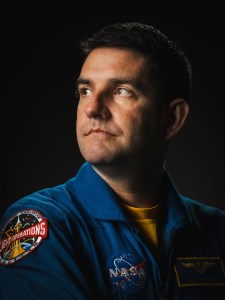
Jack Hathaway: The chief of the astronaut office. Reid had just wrote a note that said, “Please call me.” I read that and I was like, what’s going on? My initial reaction was, “Okay, this is probably good news,” cause we had heard that if it was from Reid, it’s probably good news. And if it was from one of the other reps, then it was probably not okay. I was initially pretty excited about it. I ran into the back office in the ready room, tried to get a line off the ship which took several tries, cause it never works all that well. The connectivity’s not wonderful. So it took me a little bit to get a line off the ship. I got ahold of Reid and it’s Friday night. Friday night in Texas is Friday Night Lights. He was at the local high school football game, and it might have been homecoming weekend, I can’t remember. But it was super loud. And he is like, “Hold on, I’ve got to leave the stadium before I can talk to you.” So, you know, it’s been however long it’s been, 20 minutes since I’ve read the email. And now I’m sitting on the phone while he takes three minutes to walk out the stadium to have a phone conversation with me. And I’m like, “Come on, just tell me.” So finally, he was like, “Are you interested? We’d like to offer you a spot to become a NASA astronaut, you know, if you’re interested.” And I was like, “Yeah, of course I’m interested.” He’s like, “Great, we’ll call you back with more details. We’ll talk in a few weeks when you get off the ship, but congratulations. You have a spot.” Then I walked out and he’s like, “You can tell your wife and such. You can tell your immediate family, but don’t tell everybody.” I walked out of the back office in the ready room, and I was just like, yes. I just got offered the job that I wanted. I just got offered to become an astronaut, NASA astronaut.
In that moment, “Paddles” was walking through the ship and “Paddles” is the name of the officers that grade all of our landings when we land on the aircraft carrier. And after every cycle of landings, they walk the entire ship to all the ready rooms, and they tell all the pilots their grades. It’s a very kind of public way that we make sure everyone’s safe and predictable when they land on the ship. But they walk the whole ship and they’re not known for keeping secrets. So they had just walked in just as I finished that phone call with Reid, with the chief of the astronaut office. And of course, over the next 10 minutes, as they walked the remainder of the ship, they told all 5,000 people on the ship what they had just heard. So I was not very effective at keeping a secret right away. But it was a pretty cool story. It was a pretty cool way to find out.
The Navy’s a big part of who I am, you know, when you’re in a squadron, it’s like a family. And so to find out surrounded by them and on the ship was pretty cool. And then to get another week of flying out on the ship, knowing that was kind of the end of my fighter pilot career was pretty special. And it was a pretty great opportunity to be out there. It was a pretty great way to find out. So yeah, that’s a pretty good story for me. It’s a pretty great memory.
Host: I have to say. And I think that Matt Dominick also on a ship when he found out?
Jack Hathaway: Yeah, he was, I think he was out in Japan, but in the same sort of situation.
Host: Yeah. Low connectivity. How funny is that? What about you, Chris? Any big story from the day?
Chris Birch: Yeah, let’s see. So I got the call in, I think we all got the call in October of the year we had interviewed. And I had been going through the interviews, you know, at Johnson Space Center, NASA, while I was also trying to make the Olympic team for the U.S. cycling team. And so I was in the middle of all this, and I remember my second interview, they asked me if I’d made it, and I said, no, but I was still training in racing and supporting my teammates. And so after the Olympics, after that season, I decided that I was going to retire from professional cycling and pursue some other research interests that I had. I was in Montana. My family has a working cattle ranch. Up there, it is pretty bare bones lean operation. It’s a kind of bring your own housing situation. So I was actually living in a trailer that I was actively rebuilding, holding Teams meetings, obviously with the background filter in place, talking to other, you know, bioscientist researchers about some of their projects.
I got a call one morning in the middle of a call I was having with an East Coast-based company. So pretty early in the morning. And I remember looking at the Houston phone number thinking, “I can’t end this Teams meeting that I’m on right now because I really need this job. And I want to see this project go forward, especially if that’s a no.” And so I had to let it ring and ring. And off it went. And I I had to get through this pretty technical meeting and afterwards just had to wait for them to call back. So I’m pacing up and down like the 10 feet that you can pace in this trailer between the bedroom and the back half, which is still a demo zone. And finally, Reid calls, chief of the astronaut office, calls me, picks up and says, “Oh my gosh, Chris Birch, I had to call you three times.” He asked me a couple months ago, you said you really wanted this job, and I’m here to offer you that job if you’ll still take it. And I remember not really being able to formulate a full thought. And I think what came out my mouth was that it would be the honor of my life. And that’s true. You know, it’d always been my dream as an athlete to represent my country and show what a really hardworking group of athletes, of women, can do.
So then to get to switch gears literally, figuratively, and come here was really special. So there I was like in the middle of our yard in this like half-built trailer with this life-changing news and trying to figure out what to do with it. And my now husband was actually across the globe racing the world championships. So I called him and he was in between rides. So we have like a qualification ride and a finals ride, in between rides on his way to winning his first world championship title. And so we call that day our NASA Rainbows Day, cause he earned his World Championship Rainbow Stripes and I got the call of my life. It’s a really, really special day. And actually we decided to commemorate that day for all of our relationship history by getting married on that same day the following year.
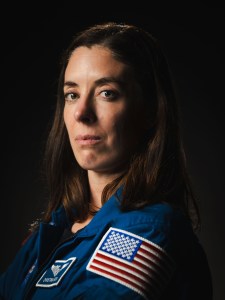
Host: This is incredible. What a full picture story. I mean, that has to be the best day of forever now.
Chris Birch: Yeah, absolutely. It’s very special to our family.
Host: Wow. Well, congrats to you both for all the training that you’ve done over the last couple of years. And I just want to talk to you a little bit about your team. You know, the Flies. What’s it been like working together as a team and, you know, you’re at one time strangers. How have you built that bond over the last couple of years?
Jack Hathaway: My favorite story of our bond is the first day we met.
Chris Birch: You and me? I was going to tell the same story.
Jack Hathaway: Alright, you do.
Chris Birch: You want to tell it? You got it.
Jack Hathaway: So I’m used to moving around and every time I move I’m like, alright, well, like every three years I’m on a new set of orders, go in a new area, meet new people, and I’ve got a new set of friends for the next three years. So it’s kind of like relatively normal to have friends for a few years. And some of them are all friends for life. But you know, you sometimes in life you move on and don’t keep day-to-day contact with people. But this move is different. You’re going to move here and you’re going to be here for 20 years, maybe for life. And so, Chris and Ashton, her husband, they were in town a few months early, a month or two early maybe. And my wife and I, Amy, had come into town a few weeks before we started. And I think, well, we had connected over email and I was like, “Hey, let’s go out to dinner.” And then you guys knew Houston really well. So we met at this great downtown restaurant, and Houston’s pretty great for restaurants. It’s a pretty awesome place for that. We walked into this great restaurant and person I’ve never met before. And I was like, “Hey, I guess we’re going to be best friends for life now.”
Chris Birch: Yeah. He stands up and gives me a giant bear hug. And I was like, alright, this is going to be it. This is exactly how I want to start this friendship, awesome.
Jack Hathaway: It’s pretty cool cause we come from very different backgrounds, right? We’re from opposite sides of the country. We’re from opposite sides of the career path. But Chris and I, and the Flies, generally, we’re all roughly the same person, right? We all believe in adventure. We all believe in science. We all believe in pushing the boundaries of exploration. We’re all not afraid of the challenge. We all just want to be part of something bigger than ourselves. It’s really easy to become friends with people like that. It’s really easy to be inspired and just such a great opportunity. It’s not hard at all to just be like, “Alright, these are my new best friends.” And it’s really intuitive and easy and simple and natural. It’s a pretty powerful team.
Chris Birch: One of the really special ways that keeps rearing its head across these two years is in all of our training, whether it’s in the jet or it’s learning these incredibly technical systems aboard space station or doing spacewalk training together. I get to see my classmates really shine in their areas of expertise. And you start to come to anticipate that there’s going to be a really tough technical engineering question about systems integration. Well, I know that Andre’s going to step up and have a really meaningful dialogue with our instructors about that, or I think Chris Williams, C-Dub, he’s one of the smartest people that I know. But somehow still insanely humble. But he is always asking questions two layers below what I think the average person would be thinking. And we just have some really incredible communicators, thinkers, problem-solvers all across the team. And it’s just been a great pleasure to be a part of it and to be growing as a human alongside them. I think like I’ve really benefited from just being totally surrounded by these people.
Host: I love that. I think I can only fit in one more question with you guys. So I want to know what you’re looking forward to now. You know, you’re coming up on graduation, you’ll be a full status astronaut, probably no flights assigned just yet, but what are you most looking forward to when it comes to being an astronaut?
Chris Birch: I’m really excited to join the office in support of Orion. I’m going to be working in that program and just to see how spaceflight happens fundamentally on the big picture scale and all of the little details that are required to design a flight, to acquisition, all of the capabilities that we need to have to be successful and to actually achieve the mission. I think that’s going to be really interesting intellectually and as well as personally fulfilling to be supporting our other crew mates that are going out. You know, Artemis II is launching here in the near future. And to be a part of the team that’s supporting them is going to be very meaningful for me.
Host: What about you, Jack?
Jack Hathaway: I’ll add on a bit about supporting the people that are in space now and supporting the office, like in the ASCAN flow and the training flow here. It’s a little bit about the 12 of us getting through the training and getting the basic level of knowledge, but it’s going to feel really good to be a contributing member of the office to get out, take our share of the load, do our capcom watches, do that increment lead role, or be in a position to help the office do its job of exploring the universe and supporting human flight in low Earth orbit and beyond it. It’s going to be pretty awesome to be able to contribute to that mission.
Host: Well, Jack and Chris, thank you so much for the time that you’ve spent with us here today on the podcast, and we are really excited to see what you do next.
Chris Birch: Thanks.
Jack Hathaway: Thanks for having us. Pretty awesome.
Host: Coming up next on the podcast is Anil Menon, Lieutenant Colonel of the US Air Force, who was born and raised in Minneapolis. He received his bachelor’s degree in neurobiology from Harvard University in Cambridge, Massachusetts, his master’s in mechanical engineering from Stanford University in Palo Alto, California, and his Doctor of Medicine from Stanford Medical School. He was SpaceX’s first flight surgeon, helping to launch the company’s first humans to space during NASA’s SpaceX Demo-2 mission and building a medical organization to support the human system during future missions. Prior to that, he served NASA as the crew flight surgeon for various expeditions taking astronauts to the International Space Station. Menon is an actively practicing emergency medicine physician with fellowship training in wilderness and aerospace medicine. As a physician, he was a first responder during the 2010 earthquake in Haiti, 2015 earthquake in Nepal, and the 2011 Reno Air Show accident. In the Air Force, Menon supported the 45th Space Wing as a flight surgeon and the 173rd Fighter Wing, where he logged over 100 sorties in the F-15 fighter jet and transported over 100 patients as part of the critical care air transport team. I hope you enjoy our conversation with Anil.
Anil, thank you so much for joining us on Houston We Have a Podcast today. You have some pretty big life events coming up with astronaut graduation. How about that?
Anil Menon: I do. Very exciting. I’m very excited to be graduating at age 47. I’ve been looking forward to it for a few decades.
Host: Wow. A dream come true, I’m sure.
Anil Menon: Yes, absolutely. I have been wanting to do this my whole life, so it is a dream come true.
Host: So let’s talk about the day it started, which I know really the interview process takes several months.But the day that you knew it was for sure that it was happening. When you got your phone call, what was that like for you?
Anil Menon: Oh, yeah. I was in a cabin with some friends from SpaceX. I worked at SpaceX at the time. We were just on a weekend retreat and I kind of had a feeling it was about the time that we would get calls, but I thought it was going to be later, and I was also getting a lot of random calls from people. Like the kind that you don’t want to answer, right? But I saw one from Houston, I thought, “Oh, I’ll answer this one.” And I answered it and it was the chief of the astronaut office, Reid Wiseman. And he asked me a question about a technical matter. And so I thought, first I was excited. Then I thought, “Oh, this is not what I thought it was going to be. He just wants to find out more information.” Then halfway through my answer, he said, “I’m just kidding. Do you want to be an astronaut?” And it blew me away. And I ran out of words at that time. He’s pretty funny, and as luck would have it, at that very moment, my wife walked into the room where I was talking to him and she could just tell that it was the call and she started crying. She gave me a big hug cause she knew how much I wanted to do it.
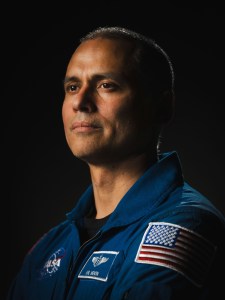
Host: Oh my gosh, that’s so sweet. But also, what a red herring from Reid.
Anil Menon: Oh yeah, thanks Reid.
Host: So you came from SpaceX, you had really good spaceflight experience already or understanding of spaceflight, and you’d worked in that arena. What were your first impressions joining NASA?
Anil Menon: Well, so I started NASA as a flight surgeon in 2012. And so I worked as a doctor here, and I had also worked in the Air Force, so I just love space medicine. I had a feel for what NASA was like so when I knew I was coming back, I knew a little bit what I was getting into. But it was definitely a lot of fun to then go and jump into the training program and see it from a totally different perspective and just the stuff you get to learn, the depth of technical knowledge about the space station, about spacewalks, added another component to the medical side that I knew. And so I loved it. It was like a kid in a candy store.
Host: And your wife also works for SpaceX, correct?
Anil Menon: She does, yes.
Host: I think that she also got a pretty important phone call not too long after you became an astronaut candidate. Is that right?
Anil Menon: Yeah. Three days after I was announced, she got called into a room at SpaceX and they asked her to join the Polaris Dawn Program, which is a free-flyer mission around the Earth with that program. And so it was pretty close and that totally caught her off guard. And so both of these things, which seemed like impossibilities just weeks before came into reality. It was just a lot to wrap our brains around and very exciting.
Host: Wow. So you’ve both been in astronaut training this whole time, really?
Anil Menon: We have, yes. Yes, that’s true. We have both been in training pretty much since then, and I’m just wrapping up my training as an astronaut and she’ll probably continue on until her mission launches.
Host: So what’s training been like for you? You know, was there anything that was different than what you expected or anything that surprised you?
Anil Menon: What was really different was just working with such a unique community of people and getting to know them on a pretty deep level. We’d do a lot of teamwork because you need teamwork in space, and you have a very small environment, and you have to figure out how to get along really well. We’d go on outdoor leadership training events, and at those, we’d have an opportunity to really see people at their most challenging times and work through it. I mean, not everything goes smoothly all the time, but the important thing is that you invest the effort, you get to know people, and you work through challenges. And so I think what surprised me is just the depth of knowing some of my teammates and classmates that I’ve gotten the great honor to be part of, which is really wonderful.
You know, bigger picture, working with the whole NASA training team is a wonderful thing. When I was here before as a flight doc, I worked at a particular segment of that and medicine’s unique in that you get to know people as well, cause they open up to you. And it’s a real special, privileged place to be. But also as an astronaut, you get to work just kind of across a broad spectrum of engineers, scientists, administrators, all sorts of people, that are just as equally excited about space. So that’s really cool.
Host: And working with a broad spectrum of people, you’re also working with like a broad spectrum of disciplines. So really no two days are the same when you’re an astronaut training. You know, one day you’re learning Russian language, the next day you’re underwater in a spacesuit. Did you have a favorite part?
Anil Menon: Oh, yeah. It was that it was being underwater. It was all of it, but yes, I think it was the underwater part that blew my mind. I remember sitting in the first class where they started talking about EVA, which is Extravehicular Activity, and it requires you to go in the pool in a spacesuit to do some training. And they showed the spacesuit. And I had always thought this would be exciting. But when it hit me that this was going to be a real thing that I could do, then I started feeling it in a different way. I was like, “Whoa, I really have to know this spacesuit and I really have to be able to figure out how to do these procedures and work with this whole crew and give it my best.” I found that really exciting. I like being pushed to my limits, and that was a good way to do it. I’ve gone now through multiple of those pool runs and each one is just a big challenge, but also an exciting challenge. We’ll prep for weeks leading up to just one of those pool runs with just a few people in that team, and then do it, and then spend a lot of time, days, afterwards just reviewing how we did what we could do better. And so it really helps us grow as a team and training team.
Host: You are a medical doctor? I don’t feel like we get a whole lot of medical doctors come through as astronaut candidates. I mean, we definitely have had a few, but how does that work translate, you know, and do you have any special tasks that are placed on you because of that?
Anil Menon: I am, yes. I am a medical doctor, so I still work in the ER as I can. I work in a trauma center in Houston. And I do that on my own time, but it keeps my skills fresh. And I think that those fresh skills are important when you start thinking about future missions and you start thinking about the tools you’ll need for those missions. So if you’re building a medical kit for the Moon landing, or if you’re thinking about a Mars mission and how many people will get sick and what they’ll need to do, if you think about it, that’d be a two-year, three-year mission and someone’s going to get sick during that time period, even if they weren’t in space. So that’s unique. And then knowing about this whole space medicine and space physiology helps inform some of the decisions we make to make that possible. Because we might go to the Moon with a vehicle that is at a lower atmosphere, but higher oxygen content. Or we might be in pressurized suits where some of the injuries and problems are similar to diving. So knowing all those disciplines and human physiology is super important. When I talk about it, space vehicles have a bunch of different systems. They have propulsion, they have avionics, they have life support systems, but the human system’s probably the most complex of those. And so you need the medical expertise to help understand that system and figure out how to make it work in space.
Host: Wow, thank goodness. Thank goodness you are a medical doctor. Let’s talk about your classmates some more. The Flies. How have you guys worked together? What was your impression of them when you started? How have you developed those bonds? You talked a little bit about the outdoor leadership training. Just what was that like going on this two-year journey with strangers?
Anil Menon: I mean, it’s one of the most unique experiences and one of the coolest parts about doing this cause it’s such a diverse group of people with different backgrounds. You have fighter pilot and flew the F-22. You have Navy test pilots, you have an Air Force pilot. That’s a lot of pilots, but we also have engineers, scientists, cyclists, oil, as they say, company person, all sorts of different folks. So it’s amazing how you can get all those different perspectives to really work together. But it takes effort. And so we would go on geology and during those trips we’d have team leaders and we’d work on a format for discussing things like we called it Plus delta, but you share something positive, something you could do better. Then we’d go on National Outdoor leadership, or you’d go on different training programs like learning the T-38 together, learning the T-6, which is another plane. And through that just get to know each other better and learn how to work with each other and really get to know folks. So it’s been a fun adventure to just like be on it with such a diverse group of people cause they all have different perspectives and different things to contribute.
Host: And I think this is a lot of people’s dream. You know, like a lifelong dream. And there are always a few people that say, “I never imagined that this could be my path.” Which was it for you? Is this a lifelong dream for you?
Anil Menon: This was definitely a lifelong dream. I wanted to do it since I saw an IMAX movie on the shuttle when I was a kid, called the Dream is Alive. But it seemed far out. I think as a kid, I knew it was potentially unrealistic, like being the President of the United States or something. And so I think I recognized that early, but I thought like, “Wow. That’s pretty cool.” But I think it was enough to inspire me to go into science. And I love going to the science museum and learning about things. I listened to astronaut’s advice, even in high school. And often they would tell you to find something you love and work at it. I took that advice, and I knew I liked medicine. I had that in the back of my mind. I knew I loved science. And so I started off college being open to medicine or science, and eventually centered on medicine when I saw the impact it could have on helping people. And so I think there was a point there during medical school that I saw there were doctors that worked into space and I was like, “Whoa, I can have both and do it at the same time.” So that’s what drew me into that. That was kind of like the long journey. I’ve probably had one of the more long journeys than my classmates or anybody out there, but it’s been wonderful. And so it just goes to show that something can start really early and if you just follow it and stick with it, anything’s possible.
Host: I think it’s interesting that when you went to college, you didn’t have your mind set on a specific thing, you know, what you loved, and you were open to what came out of that. I think that’s so important now, when there’s so much pressure to know what you want to do it right away, you know, before you even get to college, plan your track around that. So I think that’s a positive thing. But you talked about advice that you watched astronauts give of find the thing you love and go do it. You know, work hard at it. Is that the same advice you would give a younger you?
Anil Menon: I would hold onto the work hard part of that for sure. I mean, the find what you love and do is definitely true. I think working hard, when I look at the classmates around me, it seems like they’re just really skillful and they’re doing this. But the one element I see a lot of them do is be willing to work really hard at what they’re doing. They’re willing to put in time. So when we’re working on the spacewalks, we will get together and we’ll put in long hours trying to figure it out and it’s dedicated practice. Dedicated practice over time leads to opening up just about any door that you want. That could be a decade, you know, what you could accomplish in that amount of time if you’re willing to invest in it is unfathomable.
Host: During training, did you have anyone in the astronaut corps that was like a mentor to you? Did you have anybody that was a go-to if you had a question or a problem or something?
Anil Menon: Yeah, I would say my mentor was another physician. His name’s Jonny Kim. He’s e’s in emergency medicine, too. And so it was a good overlap, but we thought a lot alike. We discovered that when I was trying to figure out how to learn about flying, and there’s a lot of things you have to memorize, and one of the things medical people, but more people do is use this program called ANKI, which is just a repetition of cards that kind of brings you back to the things that you weren’t remembering and repeats them more often. It comes in many different formats, but he was way into it. So we geeked out about it and showed me how to use it. And we spent a lot of time figuring out how to memorize these kind of things. And then realized we had a lot of other overlaps. So whenever I had any questions about learning how to do spacewalks or flying, I’d turn to him and he’d always have some sage advice. Now he’s in Russia, so he is kind of like Yoda. He is far away and I have to fly out there someday and ask him some more, but he is got email, so, yeah.
Host: Thank goodness for the internet.
Anil Menon: He’s been a lifesaver at times in terms of helping me. So I’m very grateful for that.
Host: Training is wrapping up.
Anil Menon: Training’s wrapping up.
Host: Two years of dedicated training. What do you do after graduation to keep your skills sharp before you get assigned to a specific mission and you start training for that mission?
Anil Menon: That’s a great question. How do you keep skills up? I think it’s a fundamental question to anything we do. Whether it’s medicine or flying or spacewalk. It is a bit of an art and science, I think. I have taken notes throughout the process and learned things that I wanted to not forget and kind of like queued myself into those. So going back to those is really going to help to keep it fresh. But I think there’s also a certain level of currency that they expect out of us. And so we fly once a week to keep our jet skills up. And really what it does is show us how to work together in a vast real-world situation. But you also have to be able to fly the plane and do so safely. And so that’s something we’ll keep up and we’ll keep working in mission control and keep working in underwater to keep those skills up. But all those skills that are really important that you keep up, you really have to return to them and then determining how much you need, that’s a tough question. And so I think there’s a level of proficiency that we can lean on mentors to help us gauge how good we are. We can lean on our own kind of intuition in that sense.
Host: I didn’t realize that you guys had to fly once a week.
Anil Menon: We don’t have to, but I think it’s good if we are able to. Cause it gives us a chance to keep practicing those crew resource management skills. And what that means is just figuring out how to handle uncertain situations and just working together as a team. But there’s some motor skills and memory skills that go with flying, like knowing what to do if there’s an emergency or getting a feel for the jet and how to keep it at the altitude or make the turns that you need to do.
Host: What are you most excited about when it comes to being an astronaut?
Anil Menon: Believe it or not, I’ve loved training. I’ve loved these two years of training. So I think I’m most excited about continuing to be able to train. I like being the best version of myself that I can be. And this is a great challenge that I can really get motivated behind and just keep pushing myself and finding ways to get better. There’s also a great group of trainers at NASA, colleagues in the astronaut office, people that can give me the kind of feedback I need to see where I need to improve and just keep getting better at that. And so that’s my big thing that I like to do. I think I would probably find that in whatever I was doing. But this is a unique, fun environment to do that in. It’s also cool to be able to support spaceflight. I really believe in it. I really believe we as a society are going to transform our future by going to the Moon, by going to the Mars, by keep exploring, inspiring kids. And so I love contributing to that.
Host: Yeah. I love the working at NASA is something bigger than yourself.
Anil Menon: That’s a good way to put it. Yeah.
Host: And I think when you talk about the importance of spaceflight and you talked about inspiring kids, you know, not everyone will be an astronaut. And that’s okay. Because the act of inspiration, even if it doesn’t lead to someone working in spaceflight, it can lead to somebody studying medicine like you did. And so, even if it’s not this amazing inspiration to astronaut success story every time, there’s still so much value in that, “Hey, I can dream this big, or I can pursue this thing. I just want to contribute to that.” So I think that’s a really, really important value of spaceflight.
Anil Menon: I’ve thought that a lot before I became an astronaut. I thought, you know what? I love this space thing. It really helped me grow to go into medicine and through medicine, I was able to help people. I help a lot of people, and that would’ve never happened if not for that space movie or spaceflight, even if I didn’t even go to NASA. That impact happened because of that. So you’re spot on. That’s definitely true for my life.
Host: That’s amazing. Well, Anil, thank you so much for being here, giving us some time today as you’re really still in training, you’re finishing up. But I know it’s been busy and we really value that. We got to hear a little bit about your journey.
Anil Menon: It was my pleasure. It’s been a joy. So thanks. And I’m super excited to graduate and continue, and maybe we can talk again.
Host: Let’s bring it on.
Anil Menon: Alright.
Host: Up next is our chat with two United Arab Emirates astronauts, also part of the Flies.
Nora Almatrooshi, born in Sharjah is the first Emirati and Arab woman astronaut. She was selected in the second group of UAE astronaut candidates. Almatrooshi holds a bachelor’s degree in mechanical engineering from the United Arab Emirates University, and completed a semester at Vaasa University of Applied Sciences in Finland. She’s a member of the American Society of Mechanical Engineers, and previously worked as a piping engineer at the National Petroleum Construction Company. During her time there, she contributed to significant engineering projects for the Abu Dhabi National Oil Company and the Saudi Aramco, and served as a technical specialist. She was also vice president of the Youth Council at the National Petroleum Construction Company for three years.
Mohammad Al Mulla, born in Dubai, was also selected in the second group of UAE astronaut candidates. At 19 years old, he had obtained a commercial pilot’s license from Australia’s Civil Aviation Safety Authority, making him the youngest pilot in Dubai Police. At age 28, he set another record by becoming the youngest trainer in the same organization after receiving his pilot trainer license. Al Mulla earned a bachelor’s degree in Law and Economics in 2015, and an executive master’s in Public Administration from the Mohammad Bin Rashid School of Government. In 2021, with more than 15 years of experience, he also served as the head of training Department of the Air Wing Center at Dubai Police. Here’s our chat with Mohammad and Nora.
Mohammad and Nora. Thank you so much for joining us today on the podcast. And a big congratulations that you’re now coming up on graduation for being full astronauts. How does that feel?
Nora Almatrooshi: Thank you. It feels amazing. It feels like the hard work we’ve put in over the past two years has been worth it for this moment, specifically.
Host: Now, two years ago, you know, you joined this, you started this training process, but what was it like the day you found out you were going to be an astronaut? How does that process work?
Nora Almatrooshi: So our selection process works a little bit differently than what NASA does. And since our selection happened during COVID, it was also modified. The team that was working on the selection, they had to be very flexible with what they were doing, cause they had to go around. Some people were getting sick with COVID, so they had to work around that as well. There were a lot of restrictions, everyone had to wear a mask. We had to like go to certain places at specific times just to avoid the cross-contamination. But the team did a really good job during the election to make sure that everything ran smoothly.
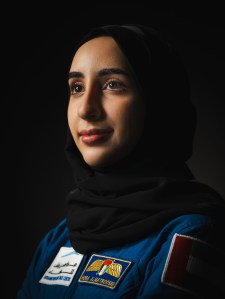
So the day we found out initially, they had asked us to come over to the Mohammed Bin Rashid Space Centre, and they asked us to bring our families as well, just so that they could explain like what the path going forward would be, if and when we got selected. Family is a huge thing back home. The Mohammed Bin Rashid Space Centre wanted to make sure that our families were on board with what we were going to be doing. So during that meeting, they met our families, explained what we would be doing, what our life would look like if we got selected, and then they told us, “Okay, we’ll tell you in a week if we selected you or not.” That was via a video call because the Director General at that time, Salem Al Marri, he was in Russia for a launch. I don’t remember exactly what it was. But he was in Russia. He wasn’t in the UAE. So I ended up like getting ready for the call, sitting in my room, having my laptop open. And the call started off with him telling me it’s been an amazing journey. We’ve met a lot of people and we’ve gone through a lot of things together. And the way that he was talking, unfortunately, in my head, I was like prepping myself. Okay, this didn’t work out. Let’s go to Plan B. I was already starting to plan for what my next step would be. And then in the middle of his speech of like, unfortunately, so we have to say goodbye to some people, he was like, oh, but don’t worry, we selected you. And I was so stuck in my head with like Plan B that I just paused. And they paused too. They were waiting for a reaction. And then they were like, “Congratulations, Nora.” I am like, “Thank you.”
Host: Oh wow.
Nora Almatrooshi: Later on, they told me, they were waiting for a reaction from you, and your face was like, blank. So I had to explain that. Well, the introduction you guys had was like, it made me think that you weren’t going to select me. So I was already starting to plan other stuff out in my head. I wasn’t in the moment, but it was true shock. And once that faded, I went out of my room and the first person I told was my brother. He’s currently 19 years old. So he is a lot younger than I am, but he’s a lot taller than I am. So when I told him, he ended up just like picking me up and then swinging me around the living room. He was really excited.
Host: So sweet. So did you have a similar experience with the video call?
Mohammad Al Mulla: Exactly the same. The General Director, he trapped me the same way he told me. I remember that he told me like, “It’s been a long journey, you know, in the future you’ll get a lot of chances.” And I have that pose that I don’t blink anything. Just watching him talking and I was like, okay. Not thinking of anything. And when he said, I remember when he said, “But we already selected you, don’t think about it.” And I was like, should I thank you? Or I should punch you or something. I was like a moment of like, should I get mad or should I be happy to get selected? But one of the things that’s really surprised me through the selection process was the medical, as a helicopter pilot, we do that like yearly. Like a medical check. But I never thought that the medical check for the astronauts will take more than a week. Like they scan all our parts, all the bones. All that. And it really surprised me much details should be done to get selected. Which was a really new experience for me.
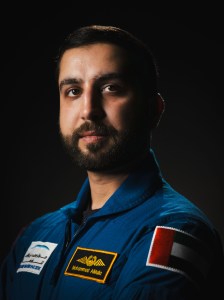
Host: That’s very interesting. So you came out to Houston, you met your classmates. What’s it been like the last couple of years working as members of the Flies?
Mohammad Al Mulla: Well, for me, I remember the first year I had that barrier of cultural difference. Also, the language barrier was a challenge for me at the beginning. I was trying to learn as much as I can, especially in like Texas culture, but—
[Laughs]
Host: It’s different.
Mohammad Al Mulla: It’s not different. But the problem is, we went through a lot of training in a lot of states. And every state has their own culture, which is really hard to understand and get them all right.
Nora Almatrooshi: It’s because they kind of like have their own slang. So it’s like you’re basically learning a new language.
Mohammad Al Mulla: A lot of people like keep telling me, “Oh, now your accents like Texas.” And I was like, “Howdy, y’all.”
Host: That was good. I believed it.
Mohammad Al Mulla: So yeah, that was my challenge for the first year. And the second year was way easier for me, but we went through a lot of training together in the wilderness with the team, and I felt like the bonding happens more in the second year of training. We start to know each other. We start to feel each other more. And actually, we know each other on what the way he liked to do things and the way he wouldn’t do it in this way. But I feel in general, we do have a really good teamwork as a class.
Host: Yeah. That’s what I’ve heard.
Nora Almatrooshi: We have really good synergy, I would say. It’s very, very evident now because right now, if I just like look at one of the Flies, I know what’s going on in their head. Whereas when I first met everyone, you couldn’t really tell what they were thinking, but now it’s like we can read each other’s minds.
Host: For better or for worse. That’s so fun. So how was training, you know, was it what you expected? Did anything surprise you during training?
Nora Almatrooshi: I think I was surprised at how many different skills are required for successful space missions. I mean, I kind of knew that you needed, well not knew, but I did anticipate having to go through some sort of medical training. Basic stuff. But I mean, usually, you would have at least one astronaut who is a doctor on station. But how in-depth you go in that training was surprising to me. The amount of emphasis on the verbatim that you use also when you’re working on station, just to make sure that everyone’s on the same page cause you have a hundred people literally working. Like you have the people who are in a mission control, and then you have people who are in the back rooms and they all have to speak the same language, use the same term and mean the same thing. So you can’t take up a lot of time to explain something. Your words have to be very exact, very crisp, to be able to get the maximum amount of information out where everyone can understand it.
Host: Right. Yeah. Just clear communication.
Nora Almatrooshi: Exactly.
Host: Did you have a favorite part of training?
Nora Almatrooshi: My personal favorite part of training was learning how to fly. Mohammad is a helicopter pilot, so he’s been doing it for like 15 years. Me, I’ve just been flying on commercial flights, so. It was very different learning how to fly a plane. I thought it would be similar to driving a car, but it’s not. It’s weird cause you have to think of like moving in 3D, 4D, it’s just a like a different way of thinking of how to control the plane. It’s not like driving. I thought it would be, but it’s not. It’s totally different.
Host: Yeah, I have no idea of what it would be like, but that’s right. Because in a car you can go forward, backward, side and side. But in a plane, you can go up and down so it’s quite different.
Nora Almatrooshi: And it takes a lot more prep than I thought to actually plan for a flight. You have to take in the fuel, how much fuel you have, how much time, the wind, the wind at different elevations, the kinds of clouds. It takes a lot of prep to fly and I didn’t realize just how much prep it took.
Mohammad Al Mulla: For me, my exciting part was of course in the spacesuit for a spacewalk. Because what I’m wondering about is like, “Okay, this is what astronaut do. They do spacewalk and that suit.” But that was not the part that surprised me. Actually, the part was it was eye-opening for me when I knew how much work a lot of people, a lot of engineer put to just develop a single procedure for a single run. I was shadowing a lot of astronauts to learn about that. And that a lot of meetings that happening, a lot of simulations going through just to write one procedure. And I really appreciate the amount of effort just putting that procedure just for me to make me success in the future. That’s really an eye-opening for me.
Host: That’s so key. And you know, we hear a lot about that of this is really the behind-the-scenes people that you don’t see that make the mission happen.
Mohammad Al Mulla: Exactly. Without these people, I don’t think anyone can succeed because they are the standards of any success in human spaceflight.
Host: So did you have any different training since you are UAE astronauts, did you have to do anything additional?
Mohammad Al Mulla: I don’t think that we got any different or any additional training. We went through with the class with all training that we’ve been trained the same. But I remember when we start, before we joined the classes, we were like training to prep ourselves. And so we had a diving training together, me and Nora. We started some Russian language back home. So it was like 30 to 40 hours, I think. Mohammed Bin Rashid Space Centre already, they kind of prep us for some training that we will face in here, but yeah.
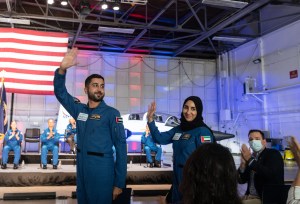
Host: That’s what I was thinking.
Nora Almatrooshi: Yeah. Yeah. We got selected, or they had selected us almost nine months before NASA made their selection. I think MBRSC was like trying to fill up our time a little bit with useful things, I guess.
Host: And make you even more prepared.
Nora Almatrooshi: Yes, exactly. And like Mohammad said, diving, and we did take like couple of hours of Russian just to like prep us a little bit.
Host: That’s pretty cool. It’s like training on top of training.
Nora Almatrooshi: And we’re going to be doing a lot more.
Host: Yeah. So that was kind of my next question. After graduation, what is next for you? Continued training?
Nora Almatrooshi: So what comes next is making sure that whatever skills we’ve gained over the past two years don’t deteriorate. So training on top of training on top of training. And a lot of it at this point wouldn’t be the same as when we were going through astronaut candidate training, but it’s more of a refresher. So basically, simulations to mimic what is actually happening on station. And once you train for worst case scenarios, then you are going to be comfortable in the nominal phase of things. So, training on top of training is I think something very essential, especially in this field.
Mohammad Al Mulla: Exactly what Nora said. But I do have like a personal goal for me is to keep learning about the culture in here in U.S. because I feel like as much as I understand the culture as much, I will understand more about my teammates. I do have a lot of funny stories about cultural difference and I can share one with you guys. I remember we’ve been in a big meeting with all astronauts and one of the astronauts said, “There is an elephant in the room.” And I was like, “Where is that?” And I remember Nick Hague was next to me and I was like, “Hey Nick, what is the elephant in the room?” And he was like, “Okay, there is some topic that no one want to talk about, so we called elephant in the room” and I was like, “Okay.”
Host: That’s true. That’s such a funny phrase.
Mohammad Al Mulla: It’s really, I know elephants in the zoo, but not in the room.
Host: Oh my goodness. Okay. I think I have time for one more question. So what are you most looking forward to about being an astronaut?
Nora Almatrooshi: What I’m most looking forward to after becoming an astronaut is actually going to space.
Host: Yeah.
Nora Almatrooshi: I mean, that’s the whole reason why I’ve been training for the past two years. It’s to have the privilege of going up to space and contributing to what humanity is doing up there, contributing to space exploration.
Mohammad Al Mulla: Yeah. For me I would love to continue the footstep that my previous astronauts set. And a UAE already announced that there will be part of Artemis and Gateway. So, we would love to be both of us. We would love to be part of that and continuing that new journey for UAE to the Moon, which, is really a big thing for us.
Host: This is an incredible time to be joining human spaceflight. I love the international component. It’s for all humanity.
Nora Almatrooshi: Exactly.
Host: Yeah. I’m really, really excited. And thank you both so much for being here. It was great talking with you.
Nora Almatrooshi: Thank you.
Host: Our final conversation today is with Christopher Williams, who grew up in Potomac, Maryland. He graduated from Stanford University in 2005 with a bachelor’s degree in physics and a doctorate in physics from MIT in 2012, where his research was in astrophysics and early universe cosmology. He then became a board-certified medical physicist, completing his residency training at Harvard Medical School in Boston. Before astronaut candidate selection, Williams worked as a clinical physicist and researcher in the Radiation Oncology Department at the Brigham and Women’s Hospital and Dana-Farber Cancer Institute in Boston. His research focused on developing new image guidance techniques for cancer treatments, and he was the lead physicist for the Institute’s MRI-guided adaptive radiation therapy program. Here’s our talk with Chris.
Chris, thank you so much for joining us on the podcast today. We are obviously extremely excited for you that your training is almost complete and you’re getting ready to walk the stage essentially and have your astronaut graduation. How are you feeling?
Christopher Williams: Well, thanks for having me. I am super excited. I think this is really the culmination of two years of a lot of training, a lot of hard work and just really excited to get to this point and to see what’s next.
Host: Of course, if we rewind two years and a little bit before that, you had a really big moment the day you found out you were going to be an astronaut. Can you tell us about that day?
Christopher Williams: the day I found out that I was going to be an astronaut, that was a really great day. It was in the midst of COVID, so kind of this really tough time in the world. I was working from home, and I had just got off of one meeting and was in between two Zoom meetings, cause that was my life back then.
Host: Totally normal.
[Laughs]
Christopher Williams: Yeah, totally normal. I got this call from a Houston, Texas number. And, you know, I fumbled and picked up the phone and it was Reid Wiseman on the other end asking if I wanted this job. And, you know, I was in just absolute shock because going through the whole selection process, you meet all of these incredible people who have these incredible stories. And, you know, you’re just sort of like, each one of these people should be an astronaut. I don’t know, you know? Any little bit of imposter syndrome you have goes into overdrive. And so you sit there and you say, “I was privileged to meet these people. One of these people is going to walk on the Moon, and I got to meet them.” That was great. And you never expect it’s going to be you.
So it was just this absolutely incredible moment. As soon as I got off the call, I texted my wife and said, “Hey, are you free to call?” My wife is an anesthesiologist. She works in the works in the hospital, and, you know, we kind of knew the call was coming. So immediately called me back. I wasn’t expecting this cause I was expecting her to be busy with work. And the first thing she said was, you know, cause I just texted her, I got the call and she said, “I’m sorry dear.” And I said, “No, no, no, no.” So then I said, “No, no, no, no. I got the call.” She was between two cases in the hospital, she ducked into like a supply closet. And it was just like, what? So I actually feel a little guilty because she had to go and put somebody under anesthesia for their surgery, realizing now that we’re moving to Texas.
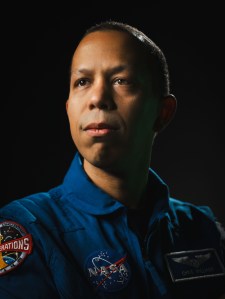
Host: Oh, wow. That’s so funny. I mean, I feel like though, like you mentioned, you meet all these incredible people and you’re probably trying to guard your emotions the whole time from getting too hopeful or too excited. And so I’m sure you’ve had that conversation when you come home from those interviews. Like, I met these incredible people and so that’s really funny. That’s a really sweet day though.
Christopher Williams: Yeah, no, it was awesome. And then it was a great experience. And then it was hard to do any work for the rest of the day. I went out and got—our daughter was one-year-old at the time—I went out to the store and got her a little NASA shirt and got my wife a set of NASA clothes. And then we spent the evening calling our immediate family all dressed up in NASA gear.
Host: Oh, that’s so sweet. So then you pick up and you move to Houston, Johnson Space Center. What are your first impressions of NASA?
Christopher Williams: So NASA is awesome. I think, you know, as somebody that sort of has grown up always being inspired by NASA, and I think my entire career, in some sense, my career trajectory was influenced by the fact that I was a little kid. I was so excited about NASA and always wanted to be an astronaut. And that led me to astronomy and physics and sort of following my career trajectory. And I think that I’ve been pleasantly surprised that getting to NASA and sort of being here. It’s hard to live up to expectations when as a kid you’re looking at this just all the incredible things that are happening here. But then you get here and I think the thing that’s really floored me the most is how awesome the people are. The people that I’ve gotten to work with, not just within the astronaut office, but all the trainers and everybody else, everybody’s so dedicated to the mission and so excited about space travel and space. And it’s awesome when you have people that are all working together for that common purpose.
Host: Yeah. I’ve heard people say over the years, you know, refer to it as the NASA family, and I moved from out of state and you moving from out of state, you probably had this too, where people were always checking in, do you need something? You know, how are you settling in giving recommendations with the best restaurants? And, you know, just making sure that you felt welcomed and taken care of.
Christopher Williams: Yeah. Absolutely.
Host: I loved that. So it’s been two years in training, and you have not been doing this by yourself the whole time. You have a pretty impressive group of colleagues, also known as the Flies. Can you tell me a little bit more about the Flies and your experience these past couple of years?
Christopher Williams: Yeah. I think the Flies, it’s been great to train with these 11 other people. I think it kind of represents one of the things that I think is one of the coolest aspects of getting to be a part of the astronaut corps, which is this incredible diversity of backgrounds, experiences, and where people come from. When I was working before as a physicist, it never crossed my mind that my colleagues would be test pilots, PhD bioengineers, drilling engineer. You get this incredible mix of people together, and it’s just so incredible to have conversations and talk about just like people’s experiences in lives or the ways they think about things. You learn so much from that. I think that that’s been one of the most fulfilling things about this, about being in this group, is just the incredible breadth of people’s experiences and their diversity. Then just getting to talk to people. It’s been awesome.
Host: Do you have any moments of the last couple of years, any favorite part of training? You know, what was training like for you anytime you leaned on your classmates, anything like that?
Christopher Williams: Yeah. Training has been, really, really interesting. Overall, I think one of the things that has stuck out to me about it is that every day is different. One day you’ll be learning about some space station system. The next day you’ll be, you know, in the Neutral Buoyancy Lab doing a practice EVA. And then the next, well, not the next day cause of fly to dive restrictions, but maybe a couple days later you’ll be flying in a T-38 jet. I think that it’s hard for me to say whether there’s like a favorite moment of training because all of it is so incredible. But if I did have to pick, I would point to some of the trips that we’ve done as a class. So we do things like travel out to do geology training as a group. And, you know, just being able to really work closely with my colleagues in kind of an environment that’s new to all of us is really fun. And, you know, just sitting around the campfire after a long day of sort of hiking around, picking up and looking at rocks is kind of nice.
Host: I think that would be my favorite part of astronaut training is the geology portion as well. Just getting to be in the field and getting to know your classmates and learning actual geology, it sounds so fun.
Christopher Williams: It’s incredible. I mean, I just feel super lucky. I mean, you know, we we’re out in the field with our classmates, so we’re getting to getting to hang out and sort of, you know, learn more about each other. But we’re also in the field with these incredible top-level geologists, professors, scientists. It’s like your own incredible little university geology class. It’s great.
Host: So after your training is officially complete and you are recognized as a full NASA astronaut, what comes next before you get assigned to a mission? You know, what will you be doing here?
Christopher Williams: So, what comes next is that we all work different jobs within the office to support the missions that we have. Both the current ones and the folks in space and the upcoming missions. So developments for Artemis and beyond. I’m super excited to take that next step.
Host: A couple more questions. What advice would you give to somebody who wants to be an astronaut? Because, you know, we’re about to start looking for new astronauts. What would you say to somebody out there who’s considering it?
Christopher Williams: Yeah, I mean, what I would say to somebody that’s considering, you know, applying to be an astronaut, I mean, the first thing I would say is just do it because I know if you’re anything like me, I always wanted to be an astronaut since I was a little kid, but by the time I was around age 11, I’d said, “Ah, that’s not a realistic dream.” But, you know, here I am. And I think that the advice I would give is that if it’s something you’ve wanted to do or you’re even considering doing, just try. You know, not trying is the 100% guarantee that you’re not going to get selected as an astronaut. So try it.
Host: That’s some of my favorite advice from my mother is the worst somebody can say is “No.” Because if you ask, the worst they can say is, no, you’re still in the same position you were before. You know? So if you weren’t an astronaut, what would you be doing right now?
Christopher Williams: So if I weren’t an astronaut, I would be back in my old career. So I was working as a medical physicist. I was working in one of the hospitals in Boston, helping treat people with cancer with radiation. So working both as a researcher and supporting the clinic there. I love that job. It’s something where I could, you know, sort of use my technical background to help people. And, you know, I think one of the reasons I got into that field was my excitement about science and space led me to be a physicist. And, you know, that was something that I love. I’d be back there doing that.
Host: That sounds really rewarding. And also, I can’t imagine the lives that have been changed through that. So it’s really impressive. Last question. What are you most excited about being an astronaut?
Christopher Williams: What am I most excited about being an astronaut? Well, I would say that the simple knee jerk answer to that is getting the opportunity to fly in space, and to be able to communicate that back and share, that experience and to make a positive contribution to our broader mission of exploring the universe. I think that if I can play a small part of helping to move the needle forward and getting us out there and exploring and exploring space, I’m excited to do that.
Host: Well, we’re excited for you and we can’t wait to see you fly. So, Chris, thank you so much for joining us on the podcast today.
Christopher Williams: It was my pleasure. Thanks for having me.
[Music]
Host: Thanks for sticking around. We hope you enjoyed hearing from all the astronauts today. Be sure to tune in to the event hosted right here at NASA Johnson Space Center, where the Flies will be graduating on March 5, 2024. Check out nasa.gov for programming. If you want more NASA podcasts, find us online at nasa.gov/podcasts. You can also find Johnson Space Center on social media on Facebook, X, and Instagram. Use #AskNASA on your favorite platform to submit your idea and make sure to mention it’s for Houston We Have a Podcast. This episode was recorded in February 2024. Thanks to the Houston We Have a Podcast team, Gary Jordan, Will Flato, Dane Turner, Abby Graf, Jaden Jennings, and Dominique Crespo. Thanks to Courtney Beasley, Chelsey Ballarte, and the astronaut scheduling team for connecting us with all of the astronauts. And of course, thanks again to the Flies for setting aside some time to speak with us and share their stories. Give us a rating and feedback on whatever platform you’re listening to us on. And tell us what you think of our podcast. We’ll be back next week.

